#Redefining Darkness Records
Explore tagged Tumblr posts
Text
Radio Brainrot - 2024.10.30
ambient dungeon synth || 2024 || Serpent's Sword Records
o()xxxx[:::::::::::::::::> o()xxxx[:::::::::::::::::> o()xxxx[:::::::::::::::::>
desert rock || 2024 || Heavy Psych Sounds
o()xxxx[:::::::::::::::::> o()xxxx[:::::::::::::::::> o()xxxx[:::::::::::::::::>
death metal, hardcore || NY || 2024 || Redefining Darkness Records
o()xxxx[:::::::::::::::::> o()xxxx[:::::::::::::::::> o()xxxx[:::::::::::::::::>
#dungeontroll#radio brainrot#the hunt for the last jewel of edarin#dungeon synth#ambient dungeon synth#fantasy synth#serpent's sword records#weregnome records#Bandcamp#sun and sail club#heavy psych sounds#desert rock#stoner rock#grunge#sickbay#death metal#redefining darkness records
2 notes
·
View notes
Text
youtube
This RIPS. Love that old school 80's thrash.
Eternal Evil - "Terror of the Sphinx" The Warriors Awakening... Brings the Unholy Slaughter! November 26th, 2021 Thrash Metal Redefining Darkness Records Stockholm, Sweden
#Eternal Evil#Terror of the Sphinx#The Warriors Awakening... Brings the Unholy Slaughter!#2021#thrash metal#Redefining Darkness Records#Stockholm#Sweden#Daily Dose of Darkness#Youtube
2 notes
·
View notes
Text
Album Review: Oxygen Destroyer - Guardian of the Universe (Redefining Darkness Records)
Seattle’s Oxygen Destroyer return with their 3rd full length album, Guardian of the Universe, set for release on the 9th of August via Redefining Darkness Records. Named after the weapon that killed Godzilla in the original 1954 movie, Oxygen Destroyer deliver blackened death/thrash metal or, as they describe it, “Brutal Thrashing Kaiju Metal”. As well as bringing some serious heaviness, the band…
#Bestial Manifestations of Malevolence and Death#blackened death#Brutal Thrashing Kaiju Metal#Chris Craven#Godzilla#Guardian of the Universe#Heisei Gamera#Joey Walker#Kaiju#Lord Kaiju#Oxygen Destroyer#Paul Wright#Redefining Darkness Records#Sinister Monstrosities Spawned by the Unfathomable Ignorance of Humankind#Skeletal Remains#Thrash Metal
0 notes
Text
UNDEAD, a Spanish death metal band, continues to haunt the scene with their 2023 album "Putrefactio" and the single "Feast for the Worms"
UNDEAD, a Spanish death metal band, continues to haunt the scene with their 2023 album "Putrefactio" and the single "Feast for the Worms". #undead
“Feast for the Worms” is the new video single from Spanish death metal band UNDEAD, taken from their album “Putrefactio” released in May 2023. The song delves into the inevitability of death, regardless of one’s status or wealth, emphasizing the universal fate of decay and consumption by worms. The video, shot in the iconic Sad Hill Cemetery in Burgos, Spain, known from Sergio Leone’s film “The…

View On WordPress
0 notes
Text
Dark science ·
“402 Terabits Per Second—Japan Breaks the Internet Speed Barrier.”
Japan has set a jaw-dropping internet speed record at 402 terabits per second, using standard fiber optic cables. That’s fast enough to download 50,000 HD movies in just one second—a leap that could redefine how we live, work, and connect in the digital world.
This isn’t just speed—it’s the future in fast-forward. Japan is proving that the next generation of technology isn’t coming—it’s already here, and it’s blazing.

21 notes
·
View notes
Text
DOGMA book: member interview translations
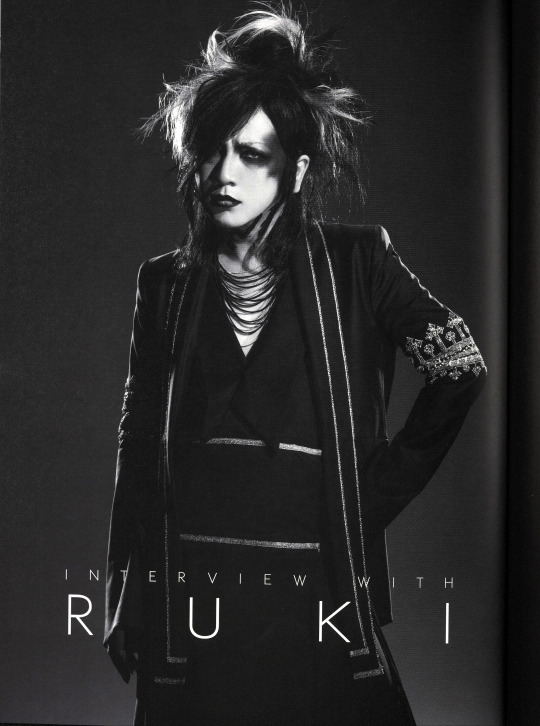
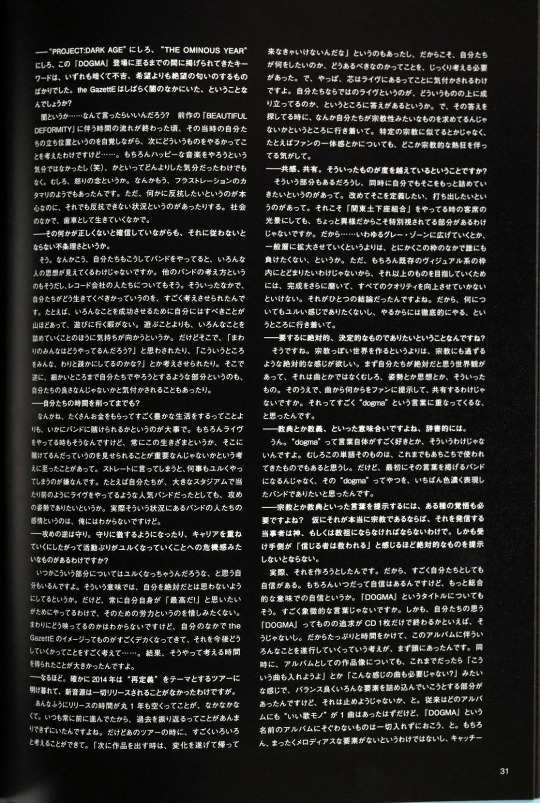
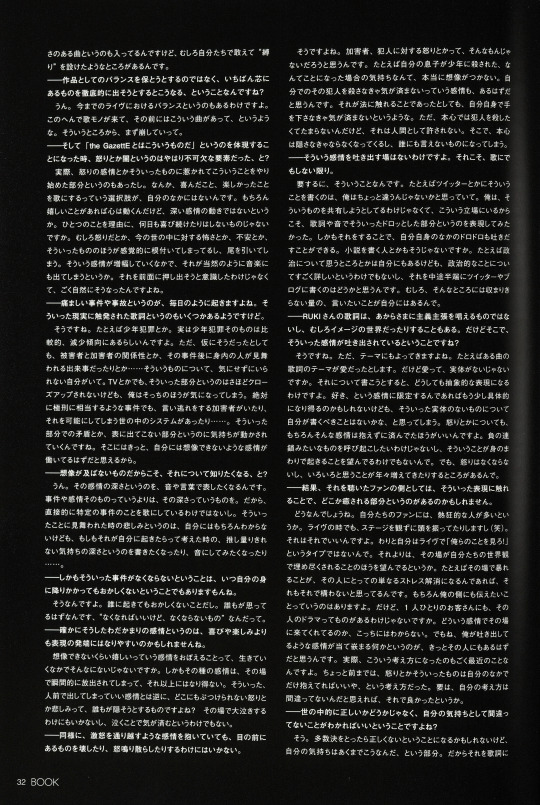
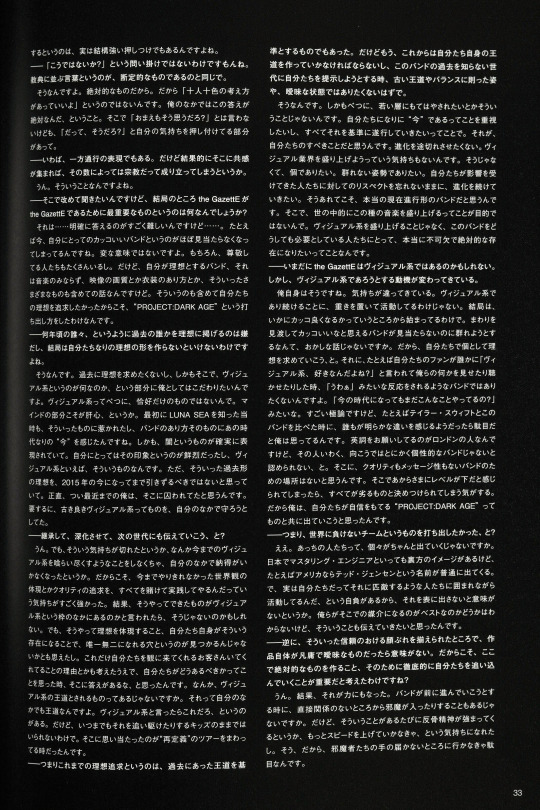
Interviewer: The keywords associated with "PROJECT: DARK AGE" and "THE OMINOUS YEAR," leading up to the release of "DOGMA," have all been gloomy, exuding a sense of despair rather than hope. Does this mean that the GazettE has been dwelling in darkness for a while?
Ruki: Rather than darkness...how should I put it? By the time the flow of time associated with our previous work "BEAUTIFUL DEFORMITY" had ended, we became aware of our standing and began thinking about what to do next. We weren't in the mood to create happy music (laughs), but we also weren't feeling gloomy. It was more like a sense of anger—a bundle of frustration. We are genuinely rebellious at heart, yet there were circumstances where we couldn't rebel, living as cogs in society.
Interviewer: You mean the absurdity of knowing that something is wrong but still having to comply with it?
Ruki: Exactly. As we continued our band activities, we encountered various people's thoughts—those of other bands and people from record companies. This made us reflect on how we should live. For instance, to achieve various successes, I had countless responsibilities and no time for leisure. My focus shifted more towards cramming in various tasks rather than having fun. But then, I'd wonder, "How does everyone else manage?" and consider if others might be neglecting such details. This made me realize that our meticulousness might actually be one of our strengths.
Interviewer: Even at the cost of sacrificing your own time?
Ruki: Instead of living a wealthy life with lots of money, it's more important for us to see how much we can dedicate to the band. Of course, this applies to when we are performing live as well, but it's crucial to show that we are betting everything on this lifestyle. I hate doing things half-heartedly. Even if we were a popular band performing in large stadiums, I'd still want to maintain an aggressive stance. Although I can't speak for the feelings of bands in that situation.
Interviewer: The opposite of aggressive is defensive. Do you have a sense of crisis about becoming complacent in your activities as your career progresses?
Ruki: There's a part of me that thinks we might eventually become more relaxed about these aspects. In that sense, I try not to think of myself as absolute. However, I do everything to feel that "we're the best!" and I don't want to spare any effort to achieve that. I don't know how others perceive it, but the image of the GazettE has grown significantly in my mind, and I have been thinking a lot about how to shape it in the future. Having time to think about it was very significant.
Interviewer: Indeed. In 2014, you were busy with a tour themed "redefinition," without releasing any new material.
Ruki: Having a whole year without a release was unusual. We were always moving forward and didn't have much time to look back. But during that tour, we could think about many things. There was a sense that when we released our next work, we had to come back changed. Therefore, we needed to think carefully about what we wanted to do and how we should be. Eventually, I realized that our core lies in live performances. The essence of our live shows is built upon something unique to us. While searching for that answer, I felt like we were seeking something akin to religiosity—not resembling any specific religion but perhaps related to the fervor of our fan unity.
Interviewer: Do you mean the degree of empathy and collective feeling beyond normal bounds?
Ruki: There might be some of that, but I also want to delve deeper into it. I wanted to redefine and present it anew. Even the sight of the audience during "Kantou Dogeza Kumiai" was extraordinary and special. So, instead of expanding into a gray zone or appealing to a broader general audience, we wanted to be unbeatable within our niche. But we don't intend to remain confined within the existing visual kei boundaries; we aim to elevate everything beyond that. That's one of our conclusions. We don't want to be lax about anything and strive to do everything thoroughly.
Interviewer: In other words, you want to be absolute and definitive.
Ruki: Yes. Rather than creating a religious-like world, we want an absolute feeling that also resonates with religious undertones. We have an absolute worldview that we believe in, and it involves attitudes and ideologies rather than just songs. We then present and share everything with our fans. That overlaps significantly with the word "dogma."
Interviewer: In the dictionary, it means doctrine or creed.
Ruki: I don't particularly love the word "dogma" itself. It's been used in many places before. But instead of being the first band to use the term, we wanted to be the band that expressed "dogma" most profoundly.
Interviewer: Using words like religion and doctrine requires a certain determination, doesn't it? If it were a real religion, the proponents would need to be gods or prophets, presenting something absolute for followers to believe in.
Ruki: We actually tried to create that. So, we're very confident in ourselves. Of course, we've always been confident, but this is more about a comprehensive confidence. The title "DOGMA" is very symbolic. And the pursuit of what we think "DOGMA" should be is not limited to just one CD. We planned to take our time to carry out various things associated with this album. At the same time, regarding the album's composition, we used to aim for a balanced inclusion of various elements, like "let's include this type of song" or "we need a song like this," but we decided to stop that. Previously, each album had at least one "good song," but for an album named "DOGMA," we decided not to include anything that didn't fit. Of course, it's not that there are no melodic or catchy elements at all...
Ruki: We have included songs with depth, but it's more like we deliberately set a 'rigidness' to it.
Interviewer: So, instead of maintaining balance within the work, you focused on thoroughly expressing the core element?
Ruki: Yes. There's always a balance in our live performances, like having a song come in at a certain point, or placing a specific type of song before another. We started by breaking away from that.
Interviewer: And when it came to embodying "this is what the GazettE is," anger and darkness were indeed essential elements?
Ruki: In reality, part of the reason we started doing this was because we were drawn to emotions like anger. Somehow, I don't have the option in myself to turn happy things or enjoyable things into songs. Of course, if something makes me happy, my heart moves, but it's not a deep emotional movement, you know? You don't stay joyful for days over one thing. Instead, anger, fear of the current world, and anxiety tend to root themselves deeply and linger. As these emotions amplify, they naturally emerge in the music, not because I consciously decided to push them to the forefront, but because it just naturally turned out that way.
Interviewer: There are tragic incidents and accidents occurring daily. Some of your lyrics seem inspired by such realities.
Ruki: Yes. For example, juvenile crime. Apparently, juvenile crime itself is relatively declining. However, regardless of that, there's a part of me that can't help but be concerned about things like the relationship between victims and perpetrators, or the incidents where family members are affected afterwards... Even though such aspects aren't often highlighted on TV, they catch my attention. Even in cases where there should absolutely be severe punishment, there are perpetrators who manage to evade responsibility, or there are systems in society that allow such things to happen... Such contradictions and hidden aspects move me emotionally because there are likely feelings involved that I can't even imagine.
Interviewer: Because you can't imagine them, you want to understand them?
Ruki: Yes. I want to express that depth of emotion through sound and words. It's not about the incident or the emotion itself, but the depth of it. Therefore, I'm not singing about specific incidents directly. While I can't understand the sadness faced by those affected, imagining it happening to me makes me want to express that depth of emotion and translate it into music.
Interviewer: And the fact that such incidents don't stop means it could happen to anyone, including yourself.
Ruki: Exactly. It can happen to anyone. Everyone must think, "It would be great if these things didn't happen, but they don't stop."
Interviewer: Indeed, those lingering feelings are easier to use as a starting point for expression compared to joy or pleasure.
Ruki: We rarely feel joy so intense it's hard to imagine in our lives. Such feelings are often momentarily released and don't go beyond that. On the opposite, anger and sadness that can't be directed anywhere are feelings everyone tries to hide. You can't burst into tears on the spot, and crying doesn't necessarily make you feel better.
Interviewer: Similarly, even if you harbor feelings of intense anger, you can't go around breaking things or shouting loudly.
Ruki: That's right. The anger towards the perpetrator or the criminal is not something trivial. For example, if my son were killed by a juvenile, I can't even imagine what kind of feelings I'd have.
I think there would be a feeling of needing to kill the perpetrator myself to feel satisfied. Even if that meant breaking the law, the feeling of needing to take matters into my own hands. However, while I might desperately want to kill the criminal in my heart, that's not something allowed for a human. Therefore, these dark feelings have to be hidden and can't be shared with anyone. Unless they're expressed through a song.
In short, that's what it is. For example, I don't think it's appropriate to write about such feelings on Twitter. I'm not trying to share those feelings with others; instead, from my position, I wanted to express those dark feelings through lyrics and sound. And by doing so, I can also expel the murkiness within myself. It's similar to how someone who writes novels might feel. For instance, I have my own thoughts on politics, but I'm not deeply knowledgeable about it, so I don't think it would be right to write about it half-heartedly on Twitter or a blog. Rather, I have a lot of things I want to say that wouldn't fit in such places.
Interviewer: RUKI-san's lyrics aren't explicitly advocating any particular ideology; sometimes it's about the world of imagery. However, that's where those emotions are being expelled, right?
Ruki: That's right. However, it depends on the theme as well. For example, if the theme of a song's lyrics is love. But love isn't tangible. When you try to write about it, it inevitably becomes abstract. If it's limited to the feeling of liking someone, it might become a bit more concrete, but I feel like there's nothing for me to write about such intangible things. As for anger, it's better not to have such feelings. I don't want to evoke a chain of negative events, and I don't wish for such things to happen around me. But anger doesn't go away, and I find myself feeling it more and more each year.
Interviewer: As a result, fans who listen to your music might find some form of healing through those expressions.
Ruki: I wonder about that. Many of our fans are quite enthusiastic. At our live shows, some don't even look at the stage and just headbang (laughs). That's fine. I'm not the type to shout, "Look at us!" during live performances. Rather, I prefer for the atmosphere to be filled with our worldview. For example, if someone releases their stress by going wild at our concerts, that's fine with me. Of course, I have things I want to convey too. But each fan has their own story. We don't know what emotions they bring with them to our concerts. But I think there's something in my emotions that resonates with each of them. I've only recently started thinking this way. Until a while ago, I thought it was enough to just keep the anger and such feelings within myself. As long as I felt my thinking wasn't wrong, that was enough.
Interviewer: It's not about being right by societal standards, but understanding that they are not wrong as your own feelings, right?
Ruki: Exactly. It might not be correct if you take a majority vote, but these are my feelings. So putting those feelings into lyrics is actually quite a forceful imposition.
Interviewer: It's not a question of "Isn't it like this?" It's more of a definitive statement, like words in a sacred text.
Ruki: That's right. It's because it's absolute. So it's not about "There are various ways of thinking." For me, this is the definitive answer. I'm not saying, "You should feel the same," but rather, "This is how it is for me."
Interviewer: So it's a one-way expression. But if it gathers enough empathy, it could even form a kind of religion.
Ruki: Yes, that's right.
Interviewer: So I'd like to ask again, in the end, what is the most important thing for the GazettE to be the GazettE?
Ruki: That's... it's really difficult to answer clearly... For example, right now, I don't find many bands that I think are cool. I don't mean that in a bad way. Of course, there are many people I respect. But the ideal band I envision, which includes not just the music but also things like the quality of the visuals and the way they dress, those elements combined, that's what I wanted to pursue, which led to the "PROJECT: DARK AGE" approach.
Interviewer: You don't want to idealize someone from the past, you have to create your own ideal form.
Ruki: That's right. I don't want to seek ideals in the past, and I want to focus on what visual kei really means. Visual kei isn't just about looks; it's about the mindset. When I first discovered LUNA SEA, I was drawn to those aspects and felt the "now" of that era in their band style. Moreover, they definitely expressed darkness. That impression was vivid for me, and that's what visual kei means to me. But I don't think we should cling to those past ideals in 2015. Honestly, until recently, I was probably trapped by that. I was trying to preserve the old-school visual kei within myself.
Interviewer: To inherit, deepen, and pass it on to the next generation?
Ruki: Yes. But I felt that I had to devour the visual kei of the past in order to be satisfied within myself. Therefore, I had a strong feeling of embodying the world view and pursuing quality that I hadn't been able to fully realize before. As a result, if you ask whether what we created falls within the bounds of visual kei, it might not. But by embodying those ideals and becoming such a presence ourselves, I felt we might find a unique position. Thinking about why so many people come to see us, I felt the answer was there. There's a traditional idea of what visual kei is supposed to be. For me, that's also the standard. When you think of visual kei, there's an image. But we can't remain kids chasing that image forever. This realization hit me while we were on the "Redefinition" tour.
Interviewer: So the pursuit of ideals so far was based on the classic model of the past. But now, you have to create your own ideal path and present yourselves to the generations who don't know your past. You can't stay in an old, balanced, or vague state.
Ruki: That's right. And it's not about wanting to be popular with younger audiences. We want to emphasize "now" in our own way and proceed with everything based on that. I think that's what we should be doing. We don't want to stop evolving. We're not trying to revitalize the visual kei industry. It's not about that; we want to be individuals. We want to maintain a stance of not blending in. We want to continue evolving without forgetting the respect we have for those who influenced us. Only by being like that can we be a truly current band. The goal is not to uplift this genre of music for the world. Instead, we want to become an indispensable and absolute presence for those who need us.
Interviewer: The GazettE might still be visual kei, but the motivation for being visual kei has changed.
Ruki: For me, it has. My feelings have changed. We're not focusing on continuing as visual kei. Ultimately, it started from wanting to be cool. Looking around, I don't see any bands that I think are cool, so it would be strange to try to blend in. So, we decided to seek our ideals as individuals. Also, when our fans show someone our music and say they like visual kei, I don't want the reaction to be "Wow." Are they still doing this in this era?" For example, and it's an extreme example, but if you compare us to Taylor Swift, I don't want there to be an obvious gap.
Our English lyrics are done by someone in London, and they say that over there, bands need to be unique to be recognized. If the quality and message of a band aren't apparent, there's no place for them. If it's clearly felt that our level is lower, everything will be dismissed as inferior. So we decided to go all out with "PROJECT: DARK AGE," creating something we could be confident in.
Interviewer: So you wanted to present a team that could compete with the world?
Ruki: Yes. Over there, each individual stands out. In Japan, mastering engineers are seen as behind-the-scenes, but in America, names like Ted Jensen are well-known. We work surrounded by people who are on par with them, and we want to show that. Whether we're the best intermediary for that is uncertain, but that's what we wanted to convey.
Interviewer: On the other hand, even if you have a reliable team, if the work itself is mediocre or vague, it means nothing. So, creating something absolute and pushing yourselves to the limit was crucial.
Ruki: Yes. As a result, it became our strength. When a band tries to move forward, obstacles sometimes come from unrelated places. But each time that happened, our rebellious spirit grew, making us want to speed up even more. We need to reach a place where those obstacles are no longer a concern.
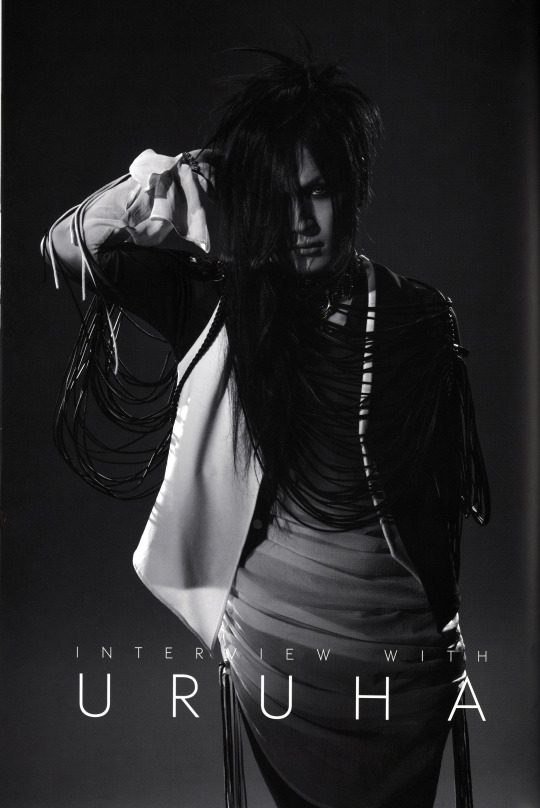
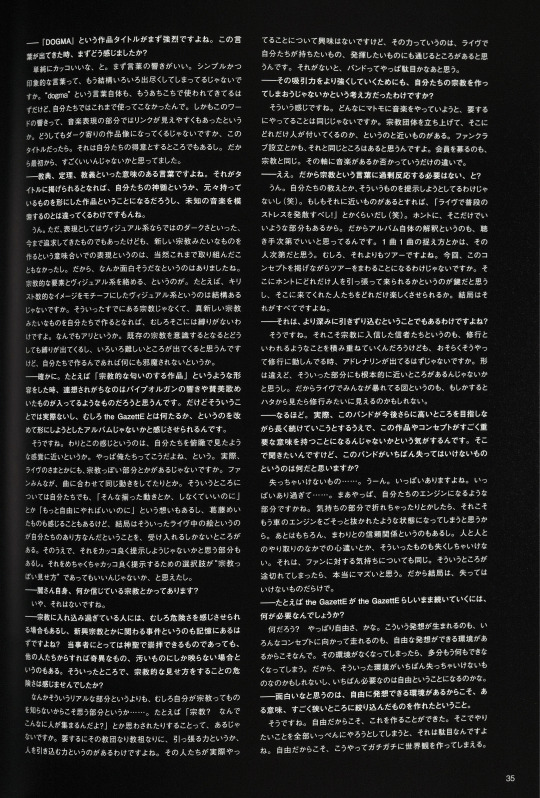
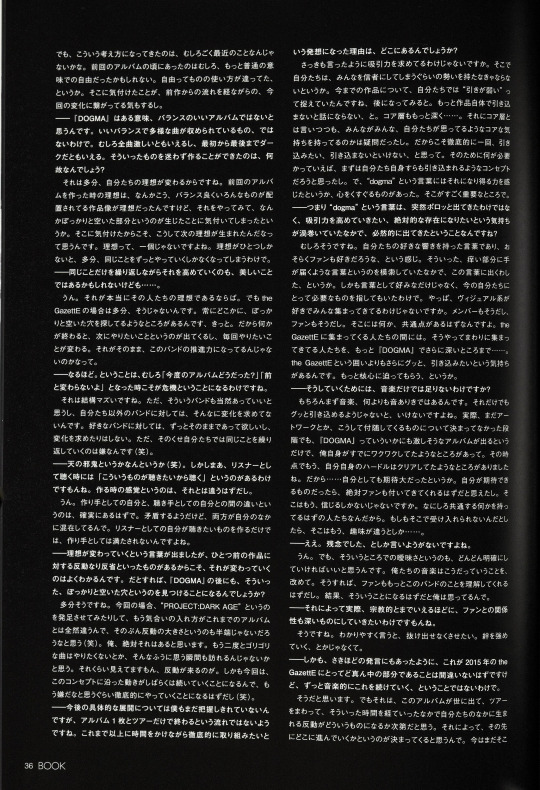
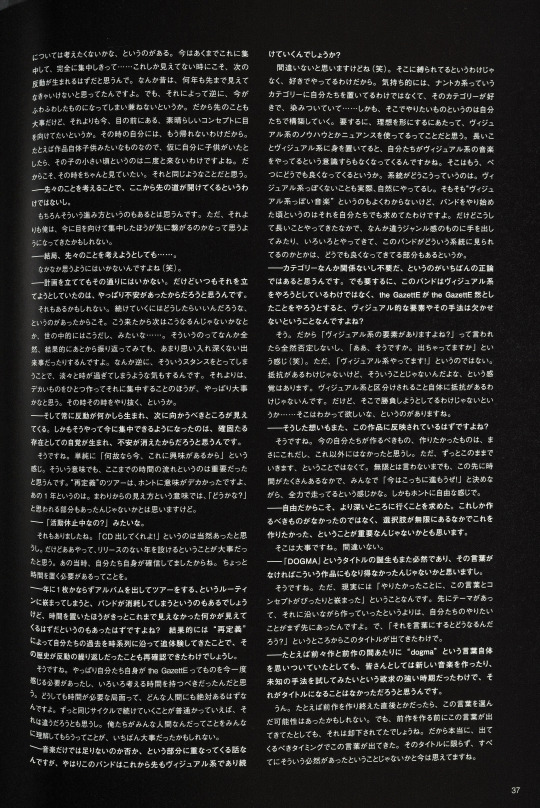
Interviewer: The title of your work "DOGMA" is quite striking. How did you feel when you first heard it?
Uruha: I simply thought it was cool. First of all, the sound of the word is good. Simple and impactful words have mostly already been used, right? Although the word "dogma" itself has already been used in many places, we hadn't used it before. The sound of this word links well with musical expression. If we use this title, the work inevitably has a darker tone. That aligns with our strengths. So, from the start, I thought it was a great idea.
Interviewer: It's a word that means creed, doctrine, or principle. Having it as a title implies that the work embodies your essence or what you've always had, rather than exploring unknown music.
Uruha: Yes. The darkness typical of visual kei that we've always pursued is part of it, but expressing the creation of a new religion is something we hadn't tackled before. So, it seemed interesting. Combining religious elements with visual kei. For example, there are quite a few visual kei bands that use Christian imagery as a motif. Instead of an existing religion, creating a brand-new one ourselves has a certain freedom. There are no constraints. If we were to be conscious of an existing religion, there would be limitations and difficulties, but if we create it ourselves, nothing gets in the way.
Interviewer: Indeed. When you describe a work as having a "religious feel," people might think of pipe organ sounds or hymn-like elements. But that's not the case here. Rather, it's an album that redefines what the GazettE is all about.
Uruha: Yes. It's like looking at ourselves from a bird's eye view. It's like, "Yeah, this is who we are." Even at our live shows, there are elements that seem religious. All the fans moving in unison with the music. Sometimes we feel, "You don't have to move like that," or "You could be more free." We feel a bit conflicted about it, but ultimately, we have to accept that this is our way. We think, "Let's present it in a cool way." So, choosing a "religious" presentation was one of the options to make it really cool.
Interviewer: Do you personally follow any religion?
Uruha: No, I don't.
Interviewer: For people who are overly devoted to religion, it can sometimes seem dangerous. We all remember incidents related to new religious movements. For the followers, it's sacred and worship-worthy, but for others, it can appear strange or dirty. Didn't you feel any danger in presenting things in a religious manner?
Uruha: Rather than those real aspects, it’s more about my own perspective since I don't really know much about religion. For example, "Why do so many people gather for this?" It's the pulling power of the sect or the leader. That power to attract people is something we want to have and show during our live performances. Without it, any band would be hopeless.
Interviewer: So, the idea was to create your own religion to strengthen that attraction?
Uruha: Yes. No matter how seriously you pursue music, it's essentially the same thing. It's establishing a religious group and seeing how many people follow it. Even starting a fan club is similar. Recruiting members is like a religion. The only difference is whether music is at the core.
Interviewer: So, there's no need to overreact to the word "religion"?
Uruha: Exactly. We're not trying to present any doctrines or teachings (laughs). If there's anything close to that, it would be something like, "You should vent your daily life stress at our live performances!" (laughs). That's really all there is to it. So, the interpretation of the album is up to the listeners. How they perceive each song is up to them. What's more important is the tour. We’ll be touring with this concept, and the key is how many people we can attract and how much we can entertain them. That's everything.
Interviewer: It also means drawing people in more deeply, right?
Uruha: Yes. Just like followers of a religion go through what they call training, producing adrenaline in the process. In a different form, but fundamentally similar. So, when people are going wild at our shows, it might look like training from an outsider's perspective.
Interviewer: I see. It feels like this work and concept will be crucial for the band to aim higher and continue for a long time. What do you think is the most important thing the band must not lose?
Uruha: The things we mustn't lose... there are many. Too many to count. The most important would be the parts that drive us. If we lose our passion, it would be like having our engine taken out of a car. Trust and relationships with those around us are also crucial. If our connection with the fans breaks, that would be really bad. So, there are many things we must not lose.
Interviewer: What do you think is necessary for the GazettE to continue being the GazettE?
Uruha: What could it be? Probably freedom. The freedom to come up with ideas and pursue different concepts is because of the environment we have. Without that environment, we wouldn’t be able to do anything. So, the most important thing might be freedom.
Interviewer: It's interesting that having an environment where you can think freely allowed you to create something very focused.
Uruha: Yes. Because we have that freedom, we could create this. Trying to do everything at once wouldn't work. Freedom allowed us to create a tightly focused world.
Uruha: But this way of thinking has only recently come about. During the previous album, the freedom we had was more in the ordinary sense. Our use of freedom was different. Realizing that change is part of the flow from the last work to this one.
Interviewer: "DOGMA" isn't a balanced album in the usual sense. It's not a collection of diverse songs with a good balance. Instead, you could say that every song is intense and dark from start to finish. Why were you able to create something like this without hesitation?
Uruha: That's probably because our ideals have changed. When we made the previous album, our ideal was to create a well-balanced work with various elements. But after doing that, we realized that it left an empty space. Noticing that gap led to the next ideal. Ideals aren't singular. If you only have one ideal, you'll end up doing the same thing repeatedly.
Interviewer: Continuously refining the same thing can be beautiful...
Uruha: Yes, if that's truly their ideal. But for the GazettE, I don't think that's the case. We're always looking for gaps, something missing. So, after finishing one thing, we always come up with the next thing we want to do. This momentum and constant change is what drives the band.
Interviewer: So, if people were to say, "How was the new album?" and the answer is, "It's the same as before," that would be a crisis.
Uruha: That would be quite bad. However, it's fine for other bands to stay the same. I don't demand change from bands I like. I want them to stay the same. But we don’t want to keep doing the same thing ourselves (laughs).
Interviewer: That’s quite contrary (laughs). As a listener, you listen to what you want to hear. But as a creator, it’s different.
Uruha: Yes. There's definitely a difference between my creator self and listener self. It may seem contradictory, but both coexist within me. Just creating what my listener self wants to hear doesn’t satisfy my creator self.
Interviewer: You mentioned changing ideals. It makes sense that reactions and reflections on the previous work lead to changes. So, after "DOGMA," will you find another gap?
Uruha: Probably. With "PROJECT: DARK AGE," we’ve put in an unprecedented amount of effort, so the reaction might be significant (laughs). I'm sure there will be moments when we think, "I don't want to do intense songs anymore." I can already see that reaction coming. And since we will continue with this concept for a while, we’ll likely feel fed up with it and be thorough to the point of exhaustion (laughs).
Interviewer: I don’t completely understand your future plans yet, but it seems like it won’t just be one album and a tour. You’re planning to take more time and be thorough.
Interviewer: What led you to this idea?
Uruha: As I said earlier, we’re seeking an attraction. We felt that we needed to have the momentum to turn everyone into believers. Looking back, we thought our previous works had a weak pull. We realized that if the work itself didn’t draw people in, it was pointless. We needed to attract our core audience more deeply. And even though we call them the core audience, we wondered if they all truly felt as passionately as we thought. That’s why we felt the need to draw them in thoroughly, at least once. To do that, we needed a concept that could captivate even ourselves. The word “dogma” had the power to do that. It had something that stirred the heart, which was crucial.
Interviewer: So, the word "dogma" didn't just pop up suddenly, but it came about naturally because you wanted to increase your attraction and become a definitive presence?
Uruha: Exactly. It’s a word with a sound we like and we thought the fans would like it too. We were searching for a word that could reach those sensitive spots, and we came across this word. It wasn’t just a word we liked; it also pointed to something we needed at the time. Everyone who likes visual kei gathered because of that. The band members, the fans, there’s a commonality among us. With “DOGMA,” we want to pull those who gather around the GazettE even deeper. We want to draw them in even more intensely than just within the circle of the GazettE. We want them to get to the core.
Interviewer: Does that mean that music alone isn’t enough to achieve this?
Uruha: Of course, music is the foundation. It must be compelling enough to draw people in on its own. Even before the artwork and accompanying elements were decided, the idea of releasing an album called "DOGMA," which seemed intense, already excited me. At that point, I had already cleared my own hurdle. So, I had high expectations. If it’s something I can look forward to, I’m sure the fans will follow. We have to believe in that. If it’s not accepted, then our tastes must be different...
Interviewer: Yes. it would be disappointing, wouldn't it?
Uruha: Yes. But I think it’s good to clarify any ambiguity. By reaffirming what our music is about, the fans will understand the band better. I believe that will be the result.
Interviewer: You want to deepen the relationship with the fans to the point where it could almost be called religious.
Uruha: Yes. To put it simply, I want to make them unable to escape. Not just strengthening the bond.
Interviewer: And as you mentioned earlier, this is definitely at the core of the GazettE in 2015, however, this doesn't mean it will continue like this musically forever.
Uruha: I think so. It depends on the reaction we get after this album is released and after the tour. It will depend on the reaction within ourselves during that time too. It will determine where we go next. Right now, it's still too early to say.
Uruha: I don't really want to think about it. Right now, I’m focusing completely on this, and when I’m entirely focused, the next reaction should naturally emerge. In the past, I thought I had to see several years into the future. But that can make the present feel insubstantial. While the future is important, I want to focus on the amazing concept in front of us now. We can't go back to who we were at that time. For example, a work is like a child; if I had a child, their early years would never come again. That’s why I want to be fully present at that moment. I think it’s the same thing.
Interviewer: Thinking about the future doesn’t necessarily open the path ahead.
Uruha: I think there's a way to move forward like that, of course. However, I've come to think that focusing on the present will connect to the future better.
Interviewer: Even if you try to think about the future...
Uruha: It doesn’t go as planned (laughs).
Interviewer: Even if you make a plan, it doesn’t go accordingly. But the reason you tried to plan was because of anxiety, right?
Uruha: That might be part of it. I was thinking about how to keep going. Like, since we came this far, what’s next, or considering the state of the world. But looking back, those events don’t end up being that meaningful. Taking that stance can make time pass by unremarkably. I think it’s more important to create something big and focus on it. To tackle each moment as it comes.
Interviewer: And by focusing on the present, some kind of reaction is always born, revealing the next step. It seems that now you can focus on the present because you've gained a solid sense of identity and the anxiety has disappeared.
Uruha: Yes. Simply put, it’s because “I’m interested in this now.” The flow of time up to this point has been important. The “redefinition” tour had a huge impact. That year was significant. From the outside, people might have wondered about it.
Interviewer: Like, “Are you on hiatus?”
Uruha: That was one reaction. People also probably said, “Release a CD!” But having a year without releases was important. At that time, we were convinced that we needed a break.
Interviewer: If you’re stuck in the routine of releasing an album and touring every year, the band might burn out. Taking time off can reveal things you hadn’t seen before. Through the “redefinition” process, you re-experienced your past chronologically and confirmed that your history was a series of reactions.
Uruha: Yes. We needed to review what the GazettE is and take time to think. Everyone has times when they need a break. Continuing in the same cycle indefinitely isn't normal. It was important for people to understand that we’re human.
Interviewer: This ties into whether music alone is enough. Will the band continue to be visual kei in the future?
Uruha: I think so (laughs). Not because we’re bound by it, but because we like it. We don’t see ourselves as fitting into a category; we just like visual kei and it’s ingrained in us. We use visual kei methods and nuances to realize our ideals. After being in visual kei for so long, we don’t even think of ourselves as playing visual kei music anymore. It doesn’t matter. We do things that don’t seem visual kei naturally. We initially sought that when we started the band, but over time, we’ve experimented with different genres. How people categorize us doesn’t matter anymore.
Interviewer: The ideal stance is that categories don’t matter and aren’t necessary. The band isn’t trying to be visual kei; rather, when the GazettE does what it does best, visual elements and methods are indispensable, right?
Uruha: Yes. So, when people say, “You have visual kei elements,” I don’t deny it. “Oh, really? That shows?” (laughs). But we’re not doing visual kei. There’s no resistance to it, but that’s not the point. I want people to understand that we’re not trying to compete within that framework.
Interviewer: That sentiment must be reflected in this work, too.
Uruha: Yes. What we should create and wanted to create is exactly this. But it doesn’t mean we’ll stay the same forever. While we may not have infinite time, we’ll decide together on the next direction and run towards it. And it feels really freeing.
Interviewer: It’s because of that freedom that you can go deeper. It’s not that this was the only thing you could create, but you chose this among infinite possibilities. That’s important.
Uruha: That’s crucial. No doubt.
Interviewer: The birth of the title “DOGMA” was inevitable, and without it, this work wouldn’t exist.
Uruha: Yes. In reality, it’s about fitting the word and concept to what we wanted to do. It’s not that we had a theme first and created around it, but rather what we wanted to do came first. Then we thought, “What word expresses this?” and that’s how we arrived at the title.
Interviewer: Even if you had thought of the word “dogma” between the previous albums, you were in a period of wanting to create new music and try unknown methods. So, it wouldn’t have been the title then.
Uruha: Yes. If we had finished the previous album and come up with this word, we might have chosen it. But if it had come up before making the previous album, it would’ve been rejected. It really appeared at the right time. I think everything had that kind of inevitability.
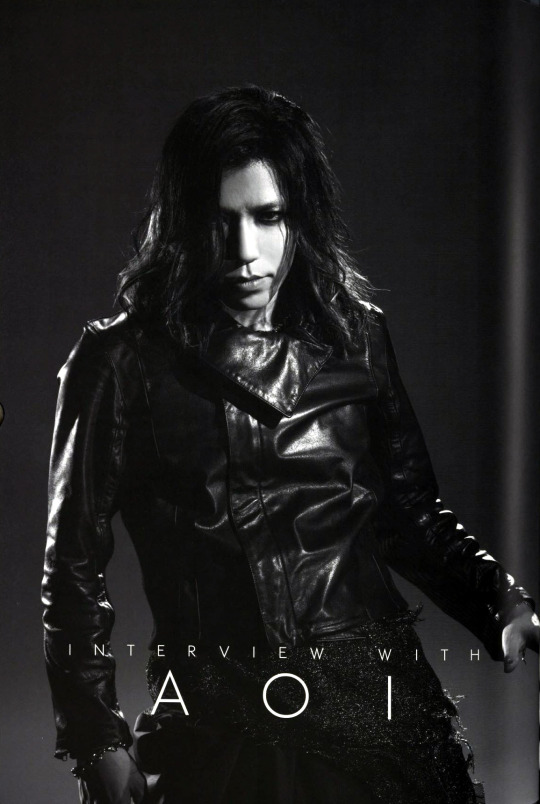
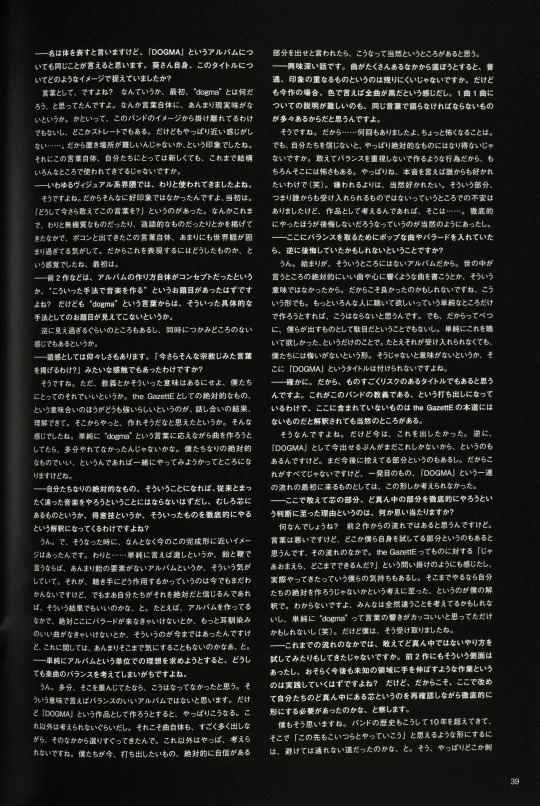
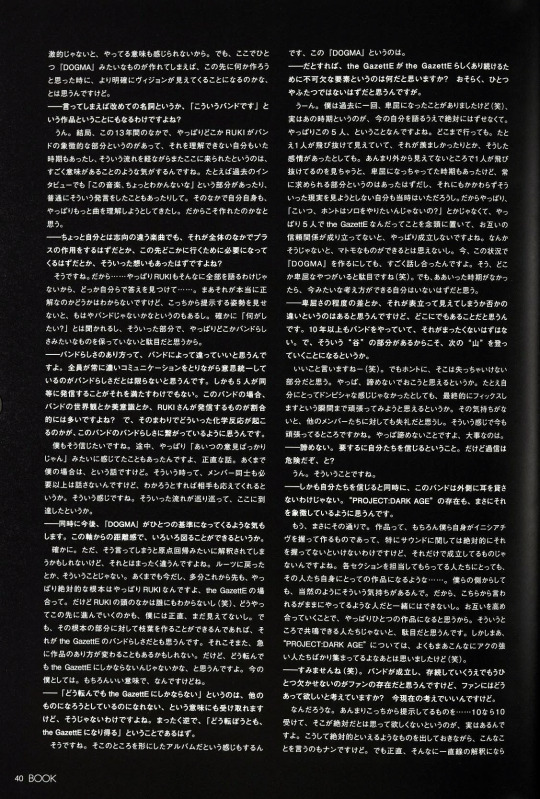
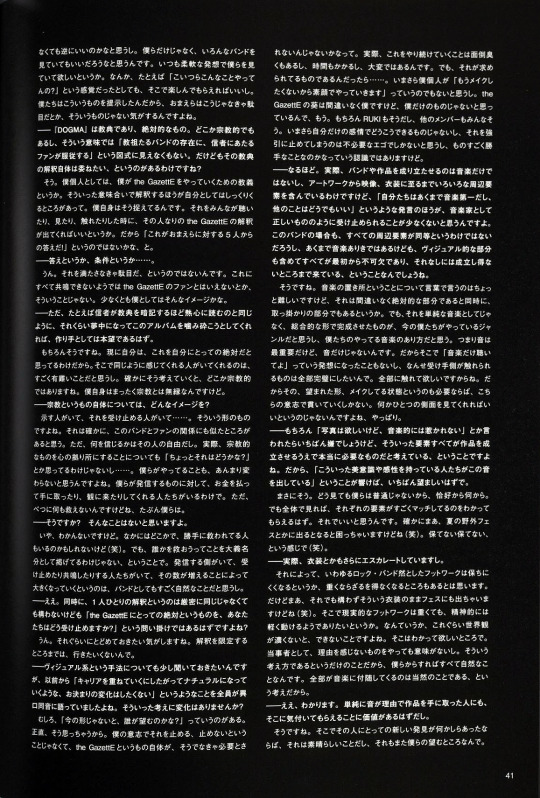
Interviewer: It’s often said that a name represents its essence, and I think the same can be said about the album "DOGMA." What kind of image did you have of this title, Aoi-san?
Aoi: You mean as a word, right? At first, I wondered, “What is 'dogma'?” The word itself didn’t feel very real to me. It wasn’t completely disconnected from the band’s image, but it also wasn’t straightforward. It didn’t quite fit comfortably anywhere. Also, while the word was new to us, it had been used in many contexts before.
Interviewer: It's been quite commonly used in the visual kei scene, hasn't it?
Aoi: Yes, exactly. So, initially, I didn’t have a great impression of it. I wondered, “Why use this word now?” There was that feeling. In our past works, we've often embraced somewhat impersonal or coined terms, and this word "dogma" appeared suddenly, with a worldview that seemed too fixed. At first, it was difficult to grasp how to approach it.
Interviewer: The previous two albums had a clear concept in terms of how the music was made, right? But with the word “dogma,” it’s hard to see a specific method or theme.
Aoi: It’s paradoxical. It’s both too clear and too elusive at the same time.
Interviewer: The word has a grandiose feel. Did it feel strange to use such a religious-sounding word now?
Aoi: Yes, but in our discussions, it became clear that it represented an absolute thing for us, something fundamental to the GazettE. Once we understood that, it started to feel doable. Simply creating songs that respond to the word “dogma” wouldn’t have worked. But if it’s about our absolute essence, then we could work with that.
Interviewer: Your own absolute essence. That wouldn’t mean creating completely different music, but rather, focusing on what you’re best at, right?
Aoi: Yes. When we thought of it that way, we started to see the final form of the album. It felt more intense, like there weren’t many sweet elements. We’re not sure how it will affect listeners, but if we believe in it absolutely, then that result is fine. In the past, we might have thought we needed a ballad or a more familiar song. But for this, we didn’t worry about that.
Interviewer: Usually, when striving for an ideal album, you tend to think about the balance of the songs.
Aoi: If we had focused on that balance, it wouldn’t have turned out this way. In that sense, it’s not a balanced album. But making it as “DOGMA” naturally led to this. We couldn’t imagine it any other way. We created many songs and carefully selected from them, which led to this result. This is what we wanted to showcase, with absolute confidence.
Interviewer: That’s an interesting point. Normally, when selecting from many songs, you avoid ones that overlap in impression. But in this case, all the songs feel dark, like they’re all black in color. It’s hard to describe each track individually because many are expressed in similar terms.
Aoi: Exactly. There were times when it felt a bit scary. But if you don’t believe in yourselves, it can’t become something absolute. Making an album without worrying about balance is inherently scary. We want to be liked rather than disliked, naturally. There was a fear that it wouldn’t be accepted, but as a work, it’s better not to have regrets. If we had added pop songs or ballads for balance, we might have regretted it.
Interviewer: So, if you had aimed to write universally good or heart-touching songs, it wouldn’t have turned out this way. But perhaps that’s why it’s good.
Aoi: Yes, the starting point wasn’t to write universally acclaimed songs. It was simply about what we wanted people to hear. Even if it’s not accepted, we have no regrets. Otherwise, we couldn’t have titled it “DOGMA.” It’s a risky title because it asserts our doctrine. If something isn’t included here, it’s not part of the GazettE’s core path.
Interviewer: It’s true. This title indicates that what’s included here is essential to the band. If it’s not included, it suggests it’s not part of the GazettE’s core.
Aoi: Exactly. But right now, this is what we wanted to release. We don’t have more to show for “DOGMA” at this moment. There’s more to come in the future, but for the first release in this series, this form is the only one we could think of.
Interviewer: What led you to the decision to focus on your core essence so thoroughly here?
Aoi: It’s hard to say. It’s a flow from the previous two works. There’s a part of us testing ourselves within that flow. It felt like a challenge to see how far we could go with the GazettE. If we were going to go that far, it made sense to establish our absolutes. That’s my interpretation. Others in the band might have different thoughts, maybe they just thought “dogma” sounded cool (laughs). But that’s how I took it.
Interviewer: In the past, you’ve deliberately tried different approaches, even in the last two albums. You’ll probably continue exploring new areas in the future. But it seems you needed to reaffirm and shape your core essence now.
Aoi: I think so too. The band has been around for over ten years, and to continue working together in the future, this was a necessary step.
Aoi: If it’s not intense, I can’t feel a reason to do it. But, I think that after we create something like “DOGMA,” then when we think about creating something in the future, our vision will become clearer.
Interviewer: So to put it bluntly, it’s like creating a noun again, it becomes a work that says "this is the kind of band we are," right?
Aoi: Yeah. Ultimately, over these 13 years, there were times when I didn’t quite understand RUKI's symbolic part of the band, but reaching this point now feels significant. For example, in past interviews, I’ve said things like, “I don’t really understand this music.” During that time, I tried to understand the songs more deeply. That’s probably why we were able to create this album.
Interviewer: Even if a song didn’t align with your own tastes, you believed it would add value to the whole, or it was necessary for where you were heading in the future, right?
Aoi: Yes, that's right. So... RUKI doesn't really explain everything, so we have to find answers ourselves... Whether those answers are correct or not is uncertain, but we need to show a proactive stance. If we don’t, we might not really be a band anymore. We do get asked, “What do you want to do?” and we have to maintain a sense of being a band.
Interviewer: What it means to be a band can differ. It’s not necessarily about everyone always having intense communication and unified intentions. In the case of this band, there are a lot of elements like the band’s worldview and aesthetics that RUKI transmits, right? And the chemistry that happens around that defines your band’s essence.
Aoi: I want to believe that too. Honestly, there were times when I felt like it was just about his opinions. That was just my perspective. At such times, the members don’t talk more than necessary to each other, but if you try to understand, the other person responds. It's that kind of feeling. Such a flow comes around, and that’s how we got here.
Interviewer: I also feel that "DOGMA" will become a standard to measure various things against in the future.
Aoi: Indeed. Saying that might be interpreted as a return to roots, but it’s completely different. It’s not about going back to our roots. It’s still about the present and, probably the future too. RUKI remains the core of the GazettE. But no one really understands what’s in RUKI's head (laughs), and I honestly don’t know how we’ll progress from here. However, if we can branch out from that core, that’s the essence of the GazettE. Our way of creating works might change. But no matter what happens, it will still be the GazettE. That’s what I believe now. In a good sense, of course.
Interviewer: When you say “it will still be the GazettE,” it could be taken as meaning that you can’t become anything else, but that’s not the case. It means that no matter how things turn, it will still be the GazettE, right?
Aoi: Yes. That’s how I feel about it.
Interviewer: So, what do you think are the essential elements for the GazettE to continue being the GazettE? I’m sure it’s not just one or two things.
Aoi: Hmm. There was a time when I was quite self-deprecating (laughs), but that period is essential to my current self. Ultimately, it’s about these five members, no matter what. Even if one person seems outstanding and I feel envious of that, or if there used to be such feelings. Even though there were times when I saw someone standing out who wasn’t very visible from the outside, there must have been a part that was always sought after, and yet at that time, I didn't try to see that reality. So, after all, it’s important to keep in mind that "this person doesn't really want to do it solo, do they?" and that it's really the GazettE with these five people, and it’s important for mutual trust to exist, or it just won’t work. Otherwise, I don’t think we can make anything decent. Even now, in this situation, when we were making "DOGMA," we talked a lot. Yes, it's no good if there’s someone who's a bit self-deprecating (laughs). But I think if there hadn’t been such a time, I wouldn’t have been able to think the way I do now.
Interviewer: Everyone experiences different degrees of self-deprecation, and whether it’s visible or not, it’s something that’s always there. After more than 10 years as a band, it’s natural to have such phases. Those “valleys” allow you to climb the next “mountains,” so to speak.
Aoi: You’re absolutely right (laughs). That’s something we shouldn’t lose. It’s about not giving up. Even if it doesn’t feel right for you personally, you push through until the final moment of fixing it. Without that mindset, it’s disrespectful to the other members. That’s what we’re working on now. It’s important not to give up.
Interviewer: Not giving up. Essentially believing in yourselves but being wary of overconfidence?
Aoi: Yes, exactly.
Interviewer: Moreover, while believing in yourselves, your band is not completely closed off to outside influences. The existence of “PROJECT: DARK AGE” symbolizes that.
Aoi: Exactly. While we take the initiative in creating our works, especially regarding sound, it’s not something we do alone. It becomes a project for everyone involved. We need people who can resonate with that. That’s what makes a work complete. Only with people who can elevate each other can we create something meaningful. However, with “PROJECT: DARK AGE,” I did feel like we gathered a bunch of strong personalities (laughs).
Interviewer: Another essential element for the band’s existence and continuity is the fans. What do you want from them? Just your current thoughts.
Aoi: What is it? I don’t want them to take everything we present as absolute. Even though we’re putting out something we consider absolute, I don’t want them to have a one-track interpretation.
Aoi: Even if they don’t take everything we put out as absolute, that might actually be a good thing. I think it’s fine if our fans also check out other bands, and view us with a flexible mindset. For example, even if they think, “What are these guys doing now?” I just want them to enjoy it. It’s not like we’re saying, “We’re presenting this, so you must accept it in a certain way.”
Interviewer: "DOGMA" is a sacred text, an absolute thing. It has a somewhat religious aspect. In that sense, it could be seen as the band being the leaders and the fans being followers. However, you want to leave the interpretation of that sacred text up to the fans, right?
Aoi: Exactly. Personally, I see it as a set of principles for me to continue being part of the GazettE. That’s how I interpret it, and it feels right to me. I think it’s great if everyone listens, watches, and engages with it in their own way and develops their own interpretation of the GazettE. So, it’s not like we’re saying, “This is the answer from the five of us to you.”
Interviewer: It’s more like a set of conditions, rather than an answer.
Aoi: Yes, and it’s not like if you don’t meet these conditions, you can’t be a fan of the GazettE. At least, that’s not my perspective.
Interviewer: But, like a devoted follower memorizing a sacred text, it would be ideal if fans get deeply engrossed in this album and try to fully understand it.
Aoi: Of course. Personally, I consider it my absolute truth. It’s very gratifying if there are people who feel the same way. In that sense, it is somewhat religious. Even though I am not religious at all.
Interviewer: What is your image of religion?
Aoi: There are those who show something, and there are those who accept it... It's that kind of thing, isn't it? Certainly, I think there are similarities to the relationship between this band and its fans. However, what one believes in is up to the individual. I don’t see anything wrong with people finding solace in something religious. What we’re doing isn’t much different. There are people who pay to take in what we put out. However, we probably can’t really save anyone.
Interviewer: You don’t think so? I believe you do.
Aoi: Well, I'm not sure. There might be people out there who feel like they've been saved in some way (laughs). But, we’re not doing this with the grand purpose of saving someone. There are creators who send out something, and there are people who receive it or resonate with it. The more people resonate with it, the bigger it becomes. That feels very natural for a band.
Interviewer: Yes. Each person’s interpretation doesn’t need to be exactly the same, but it is like asking, “How will you receive the absolute aspect of the GazettE?”
Aoi: Yes, I think that’s a good place to leave it. I don’t want to go as far as limiting interpretations.
Interviewer: I also wanted to ask a bit about the visual kei approach. Previously, you all mentioned not wanting to go down the predictable path of becoming more natural as you gain experience. Has that mindset changed?
Aoi: Not really. I think, “If we’re not like this, who would want it?” It’s not something I can just stop or continue on my own will. The GazettE needs to be this way to be necessary. Honestly, continuing this way is a hassle, time-consuming, and tough. But if it’s what’s desired… I can’t just say, “I don’t want to do makeup anymore, I’ll go natural.” Aoi from the GazettE is undeniably me, but it’s not just about me anymore. The same goes for RUKI and the other members. It’s not something I can change based on my own feelings, stopping it forcefully would just be selfish and unnecessary ego.
Interviewer: I see. Indeed, music alone doesn’t define a band or a work. There are many surrounding elements like artwork, videos, and costumes. Some may say, “We are purely about the music, everything else doesn’t matter,” and that might seem like the correct stance for musicians. However, for your band, while music is fundamental, all visual elements are essential too. Without them, it wouldn’t be complete.
Aoi: Exactly. It's hard to put into words, but while music is absolutely central, it’s also just the starting point. What we create isn’t just simple music; it’s a comprehensive form. Our genre and the way we make music are about completing this holistic form. Sound is crucial, but it’s not just about sound. We want everything the audience interacts with to be perfect. That includes the visuals and makeup, if it’s necessary for what’s desired. We’re not just about one aspect.
Interviewer: Of course, hearing someone say, “I like the photos but not the music” would be disappointing. But you believe all these elements are essential for the work to be complete, right? Ideally, the aesthetic and sensibility behind the music should resonate as well.
Aoi: Absolutely. We’re definitely not ordinary, from our looks to everything else. But if you see us as a whole, you’ll realize how all the elements match perfectly. That’s enough for me. Sure, it’s tricky for summer outdoor festivals and it’s hard to maintain (laughs).
Interviewer: Your costumes have become more elaborate too.
Aoi: It does make it harder to move like a typical rock band, heavier in a way. But we still go to festivals like this (laughs). Even if it’s physically demanding, I want to keep moving lightly in spirit. This kind of intense worldview is something you can’t achieve otherwise. As long as it feels justified, it’s meaningful for us. For us, it’s all natural. Everything naturally accompanies the music.
Interviewer: Yes, I understand. For people who initially pick up your work because of the music, noticing these elements is valuable.
Aoi: Indeed. If it leads to new discoveries for them, that’s wonderful and exactly what we hope for.
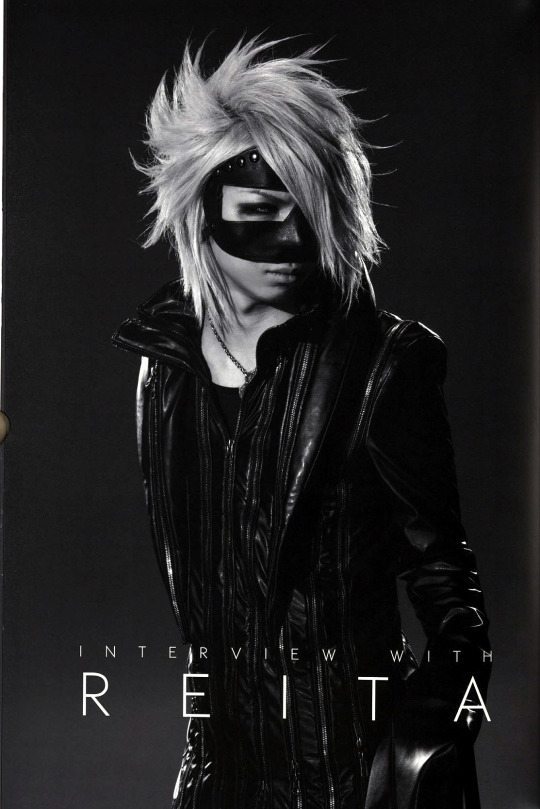
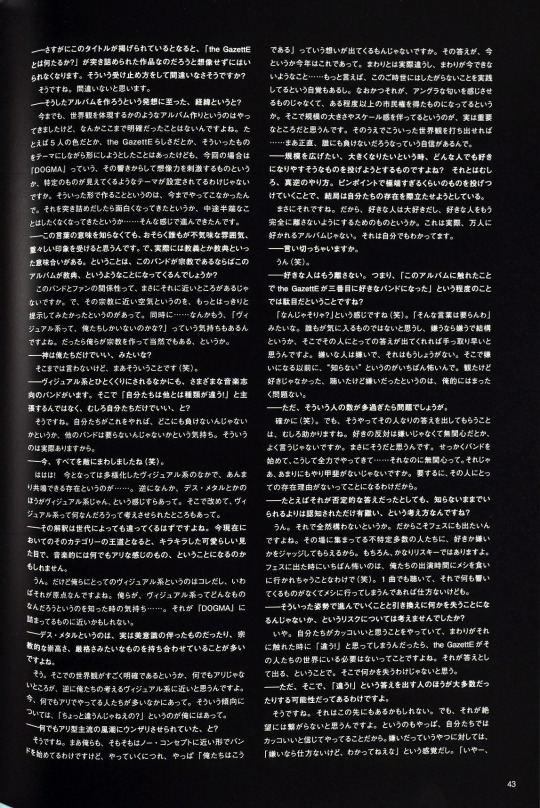
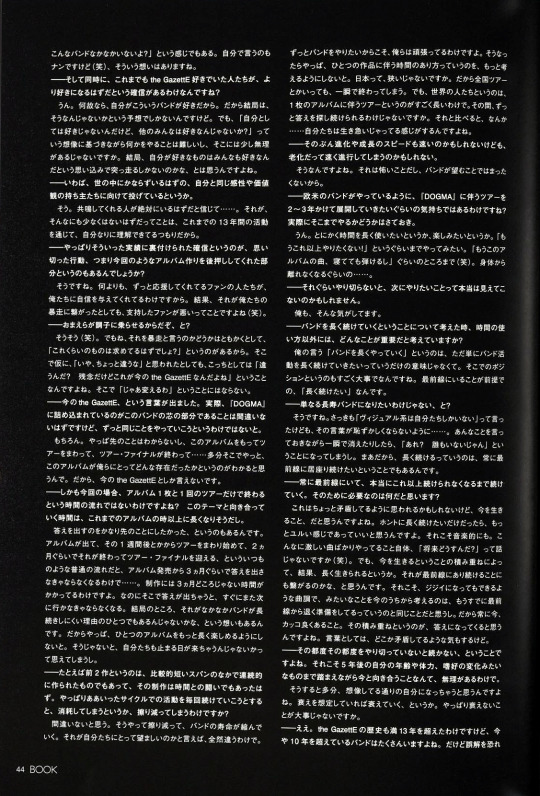
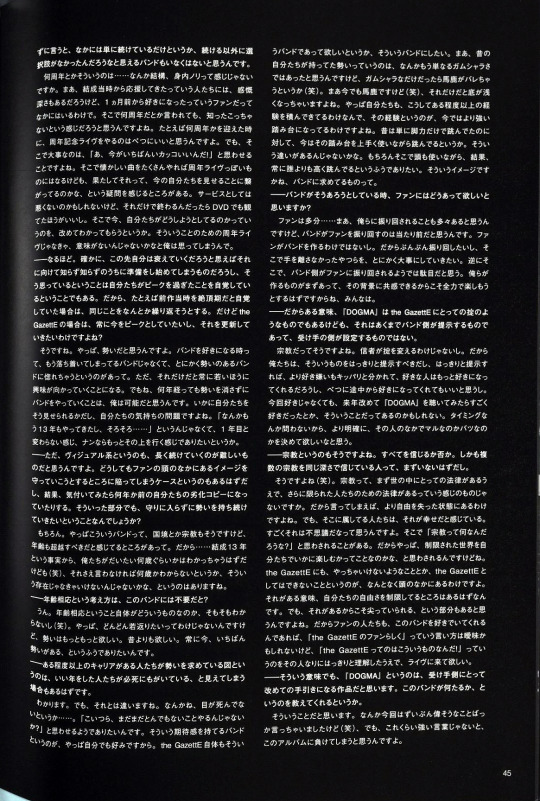
Interviewer: When you put out a title like "DOGMA", it’s inevitable that people will wonder, "What is the GazettE?" It makes you imagine that this work delves deeply into that question. Is that the correct way to perceive it?
Reita: Yes, I think that's right.
Interviewer: What led you to the idea of creating such an album?
Reita: Up until now, we've made albums that embody a certain worldview, but it's never been this clear. We've tried to shape things based on themes like the colors of the five of us or the essence of the GazettE. However, this time, with the theme of "DOGMA," the very sound of the word stimulates imagination and suggests a specific concept. We've never created an album with such a defined theme before. As we delved into it, it became more interesting and we didn’t want to do anything halfway. That’s how it progressed.
Interviewer: Even without knowing the meaning of the word, I think everyone will get a sense of a creepy, heavy atmosphere. And in reality, it means doctrine or scripture. So, if this band were a religion, would this album be its scripture?
Reita: The relationship between this band and its fans is quite similar to that, isn’t it? We wanted to clearly present that quasi-religious atmosphere. At the same time, we also feel like, "Are we the only ones left in visual kei?" If that’s the case, then it’s only natural for us to create our own religion.
Interviewer: Are you saying, "We are the only gods"?
Reita: I wouldn’t go that far, but yes, something like that (laughs).
Interviewer: There are various bands within the visual kei scene with different musical directions. Instead of asserting that "we're different from others," you’re saying it’s more like, "It's okay with just us"?
Reita: Yes, we feel that if we do this, we won't lose to anyone, and other bands aren’t necessary. That's how we feel.
Interviewer: Now, you've turned everyone into your enemies (laughs).
Reita: Hahaha! Given the diversity in visual kei today, there aren't many others we resonate with... To be honest, death metal seems more visual kei to me these days. It made me reconsider what visual kei really is.
Interviewer: That interpretation can differ by generation. Nowadays, the mainstream in that category might be characterized by a cute, sparkling look with an anything-goes musical approach.
Reita: Yeah. But for us, this is what visual kei is, and it's kind of our origin. It's how we felt when we first learned about visual kei... That might be close to what's packed into "DOGMA."
Interviewer: Death metal often accompanies an aesthetic sense, religious sublimity, and strictness.
Reita: Exactly. The clarity of that worldview, the fact that it's not just anything goes, is close to our idea of visual kei. Nowadays, there are many who do anything goes, but to me, that feels a bit off.
Interviewer: So, you were fed up with the mainstream trend of doing anything goes?
Reita: Yeah. Well, we started the band with a close-to-no-concept approach, but as we continued, the feeling of "this is who we are" emerged. That answer is what we have now. We are different from others, and we’re doing things that others can’t or wouldn’t want to do in this era. Moreover, it's not something that has a hint of the underground but rather something that has gained a certain level of acceptance. The scale and scope are important. By presenting such a worldview, I honestly believe we can’t be beaten.
Interviewer: When people aim to expand and grow, they mostly try to throw something that anyone can easily like, right? But you’re doing the exact opposite. By throwing something extremely pinpointed and extreme, you’re trying to highlight your own existence.
Reita: Exactly. So, people who like it will love it, and it’s meant to keep those who like us from ever leaving. This album isn’t something that everyone will like. I myself understand that.
Interviewer: You say that so definitively.
Reita: Yes. (laughs)
Interviewer: You want to ensure that those who like you will never leave. So, it’s not enough if someone listens to this album and thinks, "the GazettE is my third favorite band"?
Reita: "What's that?" That's the feeling (laughs). We don’t need such words. I know not everyone will like it, and if they hate it, that’s fine, as long as they come to their own conclusion. If someone dislikes it, that’s unavoidable. What’s most frightening is "not being known." Seeing but not liking, listening but hating, is not a problem for me.
Interviewer: Although, if too many people felt that way, it would be a problem.
Reita: True (laughs). But it helps to have people come to their own conclusions. They often say the opposite of love is not hate, but indifference. That’s exactly what I think. We started this band and have been doing our best... if people are indifferent, that’s unfulfilling. It means our existence doesn’t matter to them.
Interviewer: So even if the response is negative, being recognized is more important than being unknown?
Reita: Yes, I have no problem with it. That’s why I want to perform at festivals. Because there, a diverse crowd will judge if they like us or not. Of course, it’s risky. The scariest thing is people going to eat during our set. (laughs) If they listen to one song and then leave because they felt nothing, there's nothing you can do.
Interviewer: Didn't you consider the risk that pursuing this path might result in losing something?
Reita: No. If what we think is cool makes people think "that's.. different" then the GazettE doesn’t need to be in their world. That’s the answer. I don’t think we lose anything there.
Interviewer: But what if the majority ends up thinking "that's different"?
Reita: Yes, that might happen. But it won’t lead to despair. Because we believe what we’re doing is cool. To those who say they hate it, I’d just think, "If you hate it, that’s fine, but you don’t get it."
Reita: There aren't many bands like us, right? That's what I think. It might sound conceited (laughs), but that's how I feel.
Interviewer: And at the same time, you're confident that those who have liked the GazettE up until now will like you even more with this release, right?
Reita: Yes. Because I myself like bands like this. So, in the end, it's just my assumption. But it's hard to do something based on the idea, "I don't like it, but maybe everyone else will?" That just feels a bit forced. In the end, you have to run with the belief that what you like, everyone else will like too.
Interviewer: In other words, you're aiming at people out there who share the same sensibilities and values as you do.
Reita: Yes. I believe there are definitely people who will resonate with us. Through our 13 years of activity, I've come to understand that there are quite a few of those people out there.
Interviewer: Do you think that this confidence, backed by your past achievements, has pushed you to take bold actions, like making this album?
Reita: Yes. Above all, the fans who have supported us all along have given us the confidence. So even if that leads to us going a bit overboard, it’s the fans' fault for encouraging us. (laughs)
Interviewer: "It's your fault for getting us all fired up," right?
Reita: Exactly. (laughs) But, whether you call it overboard or not, we have a sense of "this is what you’re expecting from us, right?" So even if people think, "No, this isn’t it," we can say, "Too bad, but this is what the GazettE is now." We're not going to change just because of that.
Interviewer: You mentioned "the current GazettE." While it's clear that "DOGMA" represents the core of the band, you’re not saying you'll always do the same thing.
Reita: Of course. You never know what’s ahead. After we release this album, tour with it, and finish the final show, then maybe we'll understand what this album means to us. So, I can only say it's the current GazettE.
Interviewer: This time, it seems like the period you'll spend on this theme will be longer than usual.
Reita: We wanted to delay finding the answer a bit longer. Usually, after releasing an album, we start touring about a week later, finish it in two months, and reach the tour final. In such a typical flow, you end up having to find the answer within about three months from the album release. But making an album takes way longer than three months. If we have to find the answer in that short time, we have to move quickly. I feel that this is one reason why bands don't last long. We need to enjoy one album for a longer time. Otherwise, I feel like we might come to a stop.
Interviewer: For instance, the previous two albums were made in a relatively short span and were battles against time. Trying to keep up such a cycle might wear you down, right?
Reita: Definitely. You get worn out, and the band’s lifespan gets shorter. That's not desirable for us at all. We want to keep doing the band, that's why we work hard. So, we need to think more about the way we spend time on each album. Japan is small, so even a national tour ends quickly. But in other countries, the tours for one album last much longer. They keep searching for answers during that time. Compared to that, I feel like we’re rushing too much.
Interviewer: Your evolution and growth might be fast, but aging might progress quickly too.
Reita: Exactly. That’s scary, and not what we want at all.
Interviewer: Do you feel like you want to do a tour for "DOGMA" for 2-3 years, like bands in the West do?
Reita: Yes. I want to spend more time and enjoy it more. I want to do it until I feel like I can't do it anymore. I want to get to the point where I can play the songs in my sleep. (laughs) Until it sticks with me that much.
Interviewer: Maybe you won't see what you want to do next until you go all out like that.
Reita: I think so too.
Interviewer: When thinking about keeping the band going for a long time, what do you think is important aside from how you use your time?
Reita: When I say I want to keep the band going for a long time, I don’t just mean continuing the band's activities. The position we’re in is very important. I want to continue for a long time while being at the top.
Interviewer: You don’t just want to be a long-lived band?
Reita: Right. Like I said before, "there’s no one else in visual kei but us," and I don’t want those words to become embarrassing. If we say something like that and then disappear quickly, it would be like, "Oh? There's no one left." So, to continue for a long time means we want to stay at the forefront.
Interviewer: To always be at the forefront and continue until you really can't anymore. What do you think is necessary for that?
Reita: This might sound contradictory, but I think it’s living in the present. If you only want to continue for a long time, you could take it easy. Musically too. If we keep doing only intense songs, it's like, "What is there left to do in the future?" (laughs). But I think by living in the present, we can continue for a long time. That’s what keeps us at the forefront. If we start thinking about making songs that we can play even as old men, it’s like we’re already preparing to step back. So, always being cool in the present is important. That accumulation is the answer, I think. It might sound contradictory though.
Interviewer: If you don't give it your all each time, you can't keep going, right? Considering your age, physical strength, and preferences five years from now while facing the present is impossible. If you think like that, you might just become the person you imagine. Assuming you’ll decline and then changing things because of that. It’s important not to decline.
Reita: Exactly. The GazettE has been around for over 13 years now, and there are many bands that have been around for more than 10 years. But...
Reita: Honestly, I think there are some bands out there that are just continuing because they had no other choice..
Celebrating anniversaries and such can sometimes feel like an insider thing. Sure, there are those who have been supporting us since the beginning and might find it deeply moving, but there are also fans who just started liking us a month ago. For them, it might not matter if we say it’s our anniversary. For instance, having an anniversary concert is fine. But what’s important is to make people think, “Wow, they are at their best right now!” If we just play a lot of nostalgic songs, it might feel like an anniversary concert, but I wonder if it really shows who we are now. As a service, it might not be bad, but if that’s all there is, it might be better to just watch a DVD. An anniversary concert should be about showing who we are now, not just celebrating the past.
Interviewer: I see. Indeed, if you think you’re going to decline in the future, you might subconsciously start preparing for it, and thinking that way means you’re aware you’ve passed your peak. If you thought the last album was the peak, you might try to repeat the same thing. But for the GazettE, you always want now to be the peak, and you want to keep updating it, right?
Reita: Exactly. I think it’s about momentum. When you start liking a band, it’s not a settled band, but a band with a lot of momentum. If you only go for that, you’ll always be interested in the younger ones. But I think it’s possible to keep that momentum even after many years. It’s about how you present yourselves and your mindset. Instead of thinking, “We’ve been doing this for 13 years, maybe it’s time to…” we should have the same or even more energy than in the first year.
Interviewer: Continuing as a visual kei band is particularly difficult. There’s the risk of getting stuck trying to maintain the fans’ image of you, which could result in becoming a deteriorated copy of your past selves. You want to keep your momentum and not fall into that trap, right?
Reita: Of course. I think bands like us should transcend borders, religions, and even age. From the fact that we’ve been together for 13 years, people can guess our ages, but if we don’t mention it, they wouldn’t know. We shouldn’t be bound by the idea of acting our age.
Interviewer: So the concept of acting your age doesn’t apply to this band?
Reita: Exactly. I don’t even know what acting our age means. We don’t want to just get younger, but we want more momentum. More than before. We always want to be seen as having the most momentum right now.
Interviewer: To some people, seasoned bands trying to seek momentum might look like older folks desperately flailing.
Reita: I understand, but it’s different. It’s like our eyes aren’t dead. We want people to think, “These guys are still going to do amazing things.” I personally like bands that give you that feeling. I want the GazettE to be that kind of band. In the past, our momentum might have just been reckless, but being reckless alone reveals a lack of depth. Even now, we might still be a bit reckless, but we’ve gained a lot of experience that serves as a stronger base now. Before, we just jumped with leg strength, but now we use that base to jump even higher. We want to be the ones who always jump higher than anyone else, using both our heads and our experience.
Interviewer: When the band strives to be like that, how do you want the fans to be?
Reita: I think fans will often feel like they’re being dragged along by us, but I believe that’s natural. Fans don’t create the band. We want to keep swinging them around, and we want to cherish those who hold on. On the other hand, if the band gets swung around by the fans, it’s no good. We create something first, and people empathize with that and enjoy it fully.
Interviewer: In that sense, “DOGMA” is like a set of rules for the GazettE, but it’s the band that presents them, not the audience.
Reita: It’s like religion. Believers don’t change the rules. We should present them clearly, and if we do, it will be clear who likes and dislikes it, and those who like it will like it even more. It’s okay if people start liking us halfway through. Even if they don’t like it now, they might listen to “DOGMA” again next year and really like it. I want them to clearly decide if it’s a hit or miss for them.
Interviewer: That’s like religion too. You either believe everything or nothing. No one deeply believes in multiple religions equally.
Reita: Right. Religion has general laws and then additional laws for a limited group. It means you lose more freedom, but the people in it feel happy. It’s fascinating. I often wonder what religion really is. It’s about enjoying a restricted world in your own way. The GazettE also has things we shouldn’t do or can’t do as the GazettE. That might limit our freedom, but it also keeps us sharp. So if fans like this band, they should understand what the GazettE is and come to our concerts with that understanding.
Interviewer: “DOGMA” is a guide for the fans to understand what this band is all about.
Reita: I think so. I’ve been saying some pretty bold things, but we need strong words like this to match the album.
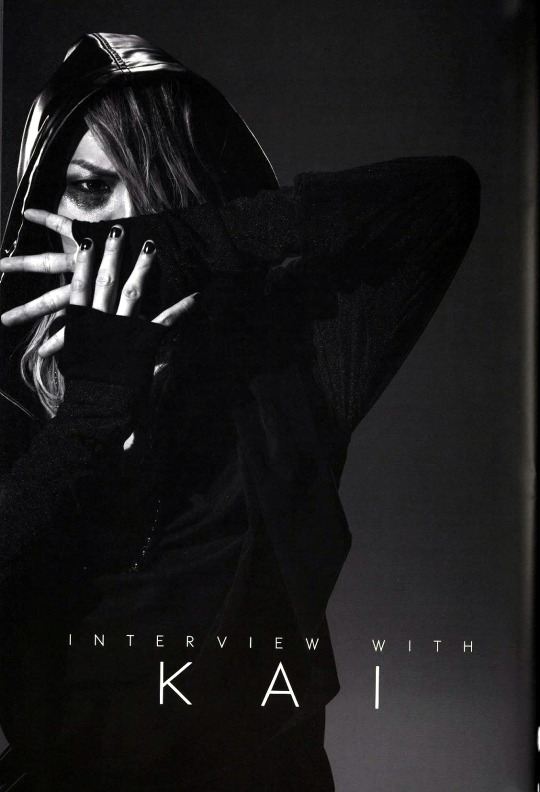
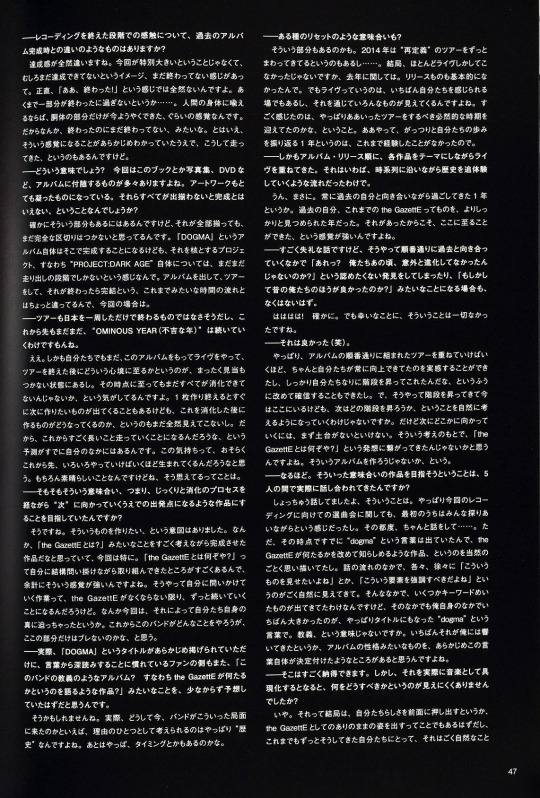
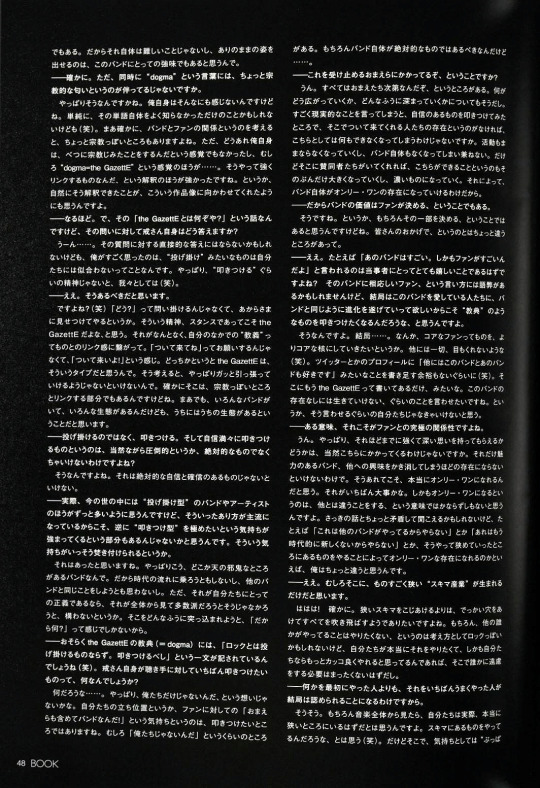
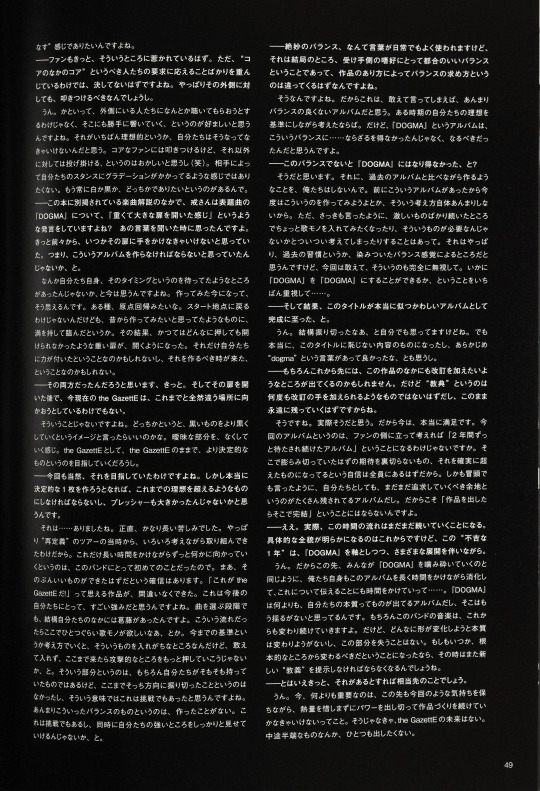
Interviewer: Looking back at the recording process, how does it compare to the completion of previous albums?
Kai: The sense of accomplishment is entirely different. It's not that this time is particularly significant, but rather that it feels like it's not quite finished yet. Honestly, it doesn't feel like a definitive "Ah, it's done!" moment at all. It feels like only a part of the process has been completed. To use a human body as a metaphor, it's like we've only just completed the torso. So, it's like we're finished, yet not finished. I was aware that I would feel this way from the start, and that’s how we’ve been progressing.
Interviewer: What do you mean by that? This time, there are many additional elements like the book, photo album, and DVD. The artwork is also very elaborate. Does this mean it won't feel complete until everything is released?
Kai: That's part of it, but even when everything is ready, I don’t think it will feel like a complete closure. The album "DOGMA" itself will be complete, but the "PROJECT: DARK AGE," is still just starting. The flow of time is different this time. It's not like before, where we released an album, toured, and then it was done.
Interviewer: The tour seems far from over, as it’s not just confined to Japan. It looks like the "OMINOUS YEAR" will continue.
Kai: Yes, and we still don’t know what our mindset will be after the album and tour. I feel like we won't have fully processed everything by then. Sometimes, right after finishing an album, you want to start creating the next one. But I can't see what we’ll create after digesting this one. I predict that we'll be running for a long time from now. This feeling will probably grow stronger as we move forward, which is a wonderful thing.
Interviewer: Did you aim to create this album as a starting point for a slow and thorough process leading to the next phase?
Kai: Yes, we intended to create something like that. This work was being done while we pondered deeply about what "the GazettE" means. This reflection has been especially strong this time. The process of questioning myself about the band's essence will continue as long as the GazettE exists. This time, we’ve delved into our true essence. Regardless of what we do in the future, I think this core part will remain unshaken.
Interviewer: Fans, used to interpreting your words deeply, might have expected this album to define the GazettE's doctrine, given its title "DOGMA."
Kai: That might be true. One of the reasons we reached this point is due to our history. Timing also plays a part.
Interviewer: Was there a sense of resetting involved?
Kai: Maybe. We toured under the theme of "redefinition" in 2014, performing mostly live shows and not releasing much. Live shows are where we feel the most like ourselves and gain various insights. I felt that it was a necessary time to thoroughly reflect on our journey, something we hadn’t done before.
Interviewer: The tour followed the release order of your albums, allowing you to relive your history in chronological order.
Kai: Exactly. It was a year of constantly facing our past. We were able to look at the GazettE and ourselves more closely than ever before. This is why we’ve reached the point we are in now.
Interviewer: This might sound rude, but didn’t you discover anything you’d rather not admit, like thinking you hadn’t progressed as much as you’d hoped or that your earlier work was better?
Kai: (Laughs) Fortunately, not at all.
Interviewer: That’s good to hear (laughs).
Kai: As we performed more tours following the order of our albums, we realized we had consistently improved and climbed our own ladder. Now, we're here, and naturally, we start thinking about what ladder to climb next. But to move forward, we need a solid foundation. This led us to question, "What is the GazettE?" and create an album around that concept.
Interviewer: I see. Did you discuss this among the five of you?
Kai: Yes, we frequently discussed it. Initially, everyone was cautious, but we talked things over each time. The word "dogma" had already come up, so we naturally envisioned an album that reaffirms the essence of the GazettE. Through discussions, we gradually identified the elements we wanted to highlight. One of the most significant keywords for me was "dogma." It resonated with me and seemed to define the album's character.
Interviewer: That makes sense. However, when it comes to embodying that in music, wasn't it challenging to figure out what to do?
Kai: Not really. Ultimately, it's about fully expressing ourselves and presenting the GazettE as we are. We’ve always done that, so it felt natural to us.
Interviewer: True, but the word “dogma” also has a somewhat religious connotation, doesn’t it?
Kai: Maybe, but I don’t feel that much. Perhaps because I didn’t know the word well. (laughs) Sure, the relationship between a band and its fans can seem a bit like a religion. But for me, it wasn’t about doing something religious; it was more about “dogma of the GazettE.” That strong link in interpretation led me naturally to this project.
Interviewer: I see. What does “the GazettE” mean to you?
Kai: Well... It might not be a direct answer, but I feel that we are not suited to “throwing things out there.” We need to “smash it down” instead. That’s who we are.
Interviewer: Indeed, that’s how it should be.
Kai: Right? (laughs). Instead of asking, “How do you feel?” it’s about showing it blatantly. That’s the spirit, the stance that defines the GazettE. It links strongly with the concept of “dogma.” It’s not about asking fans to follow us; it’s about demanding they come along. That’s the type the GazettE is. So, we must lead with that strength. Sure, it might link with the religious aspect, but every band has its way. That’s ours.
Interviewer: Rather than “throwing it out,” you “smash down.” And what you smash down must be overwhelming or absolute, right?
Kai: Yes, it must be something we have absolute confidence and conviction in.
Interviewer: In today’s world, there seem to be more bands and artists that “throw things out there.” Don’t you think that makes you want to perfect the “smashing down” approach even more?
Kai: Yes, there’s that contrarian streak in our band. We don’t try to follow the trends or do the same as others. If it’s our truth, it doesn’t matter if it’s mainstream or not. Even if criticized, it’s like, “So what?”
Interviewer: I suppose the GazettE’s “doctrine” includes the phrase, “Rock is not about throwing out; it’s about smashing down.” What’s the one thing you most want to smash down to your listeners?
Kai: That It’s not just us. It’s about the feeling that “You, the fans, are also part of the band!” It’s about smashing down the sense that “It’s not just us.” The band must be absolute, but...
Interviewer: You mean it’s up to the fans to take it in, right?
Kai: Yes, everything depends on you. What spreads and deepens also relies on you. Speaking practically, if we throw down something confident, but no one follows, we can’t do anything. Our activities will falter, and the band might cease to exist. But if we have supporters, what we can do grows and deepens, making the band unique.
Interviewer: So the band’s value is decided by the fans too.
Kai: Yes, in part. It’s not just “thanks to you all.”
Interviewer: Like, “That band is amazing, and so are their fans,” right? Ultimately, you want fans to evolve with the band, which makes you want to smash down this “doctrine.”
Kai: Exactly. I want core fans to become even more core. So dedicated that they don't even have room in their profile to mention other bands (laughs). Just the GazettE. Saying they can’t live without us. We need to be that kind of band. That’s the ultimate relationship with fans.
Interviewer: Right. Having fans that deeply dedicated depends on the band’s charm, right?
Kai: Yes, we need to be a band so compelling that fans have no interest in others. Only then can we be truly unique. It’s not about doing something different from others but being compelling in our way.
Interviewer: Otherwise, it’s just a narrow niche.
Kai: Haha! Exactly. Instead of a narrow niche, we should aim to blow everything away. It’s very rock n roll to not follow others, but if we can do it, why hesitate?
Interviewer: The ones who do it best get recognized, not necessarily the first one to do it.
Kai: Right. In the big picture, we are niche, but we’re making our mark there.
Interviewer: Fans are surely attracted to that aspect. But it’s not just about prioritizing the demands of what you could call the "core of the core" fans. You must also aim to make an impact on those outside that core.
Kai: Yeah. But it’s not about trying to make those on the outside listen to us; it’s preferable if it resonates with them naturally. That’s the ideal, and I believe we need to achieve that. We strike hard at our core fans, but just throwing it out to everyone else would be strange (laughs). We don't want our stance to have a gradient based on the audience. We always want to be either black or white.
Interviewer: In the song commentary included in this book, you mentioned that the title track "DOGMA" felt like "opening a heavy and large door." When I heard that, I thought you must have felt that at some point, you had to reach out to that door. In other words, you thought you had to make an album like this eventually, right?
Kai: I think we were waiting for the right timing ourselves. Now that we’ve made it, I feel that way. It’s a kind of return to our roots. We’re not going back to the starting point, but we approached something we always wanted to create with full readiness. As a result, a heavy door that we couldn’t open no matter how hard we pushed before has now opened. Maybe it’s because we’ve gained strength, or maybe it was just the right time to make this.
Interviewer: It was probably a bit of both. And after opening that door, the current the GazettE isn’t necessarily trying to head to a completely different place than before.
Kai: Not at all. It’s more about making the dark parts even darker, so to speak. It’s about eliminating ambiguous parts and striving for something more definitive as the GazettE, while still being the GazettE.
Interviewer: Of course, that’s what you aimed for this time as well. But I think there must have been a lot of pressure to create a truly definitive piece that surpasses your previous ideals.
Kai: Yes... there was. Honestly, it was quite a long period of struggle. We worked on it while thinking about various things since the time of the "redefinition" tour. This was the first time for our band to continuously work toward something over such a long period. Well, I’m confident that the result is something good. We’ve definitely made a piece that we can proudly say, "This is the GazettE!" I believe this will be a great strength for us moving forward. Even in the stage of selecting songs, we had quite a bit of inner conflict. For instance, thinking, "In this flow, it would be nice to have at least one melodic song here." According to our previous standards or way of thinking, we would tend to include something like that, but we deliberately didn’t, deciding instead to push more on the aggressive side. This approach was something we originally had within us, but we had never gone this far in that direction before, so in that sense, it was also a challenge. We’ve never made something with this kind of balance. This is both a challenge and a way to firmly showcase our strengths.
Interviewer: The term "perfect balance" is often used in everyday life, but in the end, it’s just a balance that suits the preferences of the receiver. The way balance is sought depends on the nature of the work itself.
Kai: That’s right. So, to put it bluntly, this might not be a well-balanced album. If you consider it from the ideal of a certain period of ourselves. But the album "DOGMA" couldn’t have been balanced in any other way... it had to be like this.
Interviewer: In other words, it wouldn’t have been "DOGMA" if it wasn’t for this kind of balance?
Kai: Exactly. Also, we don’t create albums by comparing them to our past works. We don’t think, "We made this kind of album before, so let’s try making this kind now." As I mentioned earlier, there were times when we felt the need to add a melodic song after a series of intense tracks, thinking it might be necessary. That’s due to past habits or ingrained sense of balance. But this time, we completely ignored that. We focused most on making "DOGMA" as "DOGMA" as possible.
Interviewer: And as a result, you’ve completed an album that truly fits its title.
Kai: Yes. Even I feel that we really pushed the limits. But we’ve truly created something that lives up to the title, and I’m glad we had the word “dogma” from the beginning.
Interviewer: Of course, there may be parts within this work that you might want to revise in the future. But a “canon” isn’t something that can be repeatedly revised, and it’s meant to last forever in its current form.
Kai: Yes, I think so too. That’s why I’m really satisfied right now. For fans, this album is "an album they’ve been waiting for for two years." We’re confident that it’s something that won’t betray their high expectations, something that even surpasses them. Moreover, as I mentioned at the beginning, it’s an album with plenty of room for further exploration on our part. That’s why releasing a work doesn’t mean it’s complete.
Interviewer: Ofcourse. This flow of time will continue for quite a while.
Kai: The full scope will become clear moving forward, but this "ominous year" will involve various developments with "DOGMA" at its core. So, just like everyone will be breaking down "DOGMA," we’ll also spend a long time digesting this album and communicating about it. "DOGMA" is an album that reflects our essence more than anything, and I believe that part will remain unshaken. Of course, our music will continue to evolve, but no matter how much its form changes, the essence won’t change, and we won’t lose this part. If at some point, we decide that we need to change fundamentally, then we’ll have to present a new "doctrine" again.
Interviewer: But surely, if that ever happens, it will be far in the future.
Kai: Yes. Right now, the most important thing is to keep this mindset we have, continue creating works with the same passion and energy, and give our all. Otherwise, there is no future for the GazettE. We don’t want to release anything half-baked.
...
.......
...
Part 1 of the Dogma Book translations (members comments about each song)
Once again, all the scans are from the archive (rad-is-more) All translations are ChatGPT, edited by me. I added the book text pages themselves because I often read interviews and want to look more deeply into a certain passage but people never provide the source of the translation so it's impossible to do. This might not be the most aesthetic way to do an interview post but it's the most convenient for me personally. Also, I've noticed all the pieces like photos, art and interviews are very scattered on this site. Fragmentation only leads to misunderstanding and I am trying to piece everything together as much as possible, even though it leads to very long posts.
#the gazette#Featuring: ruki talking about taylor swift!#Reita and Uruha talking about how they want to pull you in to their core and have you locked there forever?#Ruki living rent free in aois head!#And kai hating it if you put other band names in your bio!#dogma book#interview translations#dogmatic#mi
87 notes
·
View notes
Text
Verses Unwritten: A Rap Odyssey
Eminem x Rapper!OC
Verse 8
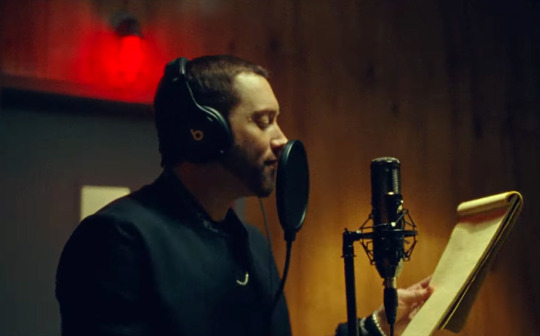
About: The studio pulses with high-octane energy as creativity and tension collide. As Genji delivers verses that cut to the core, she not only claims her space but also pushes Eminem to confront emotions he's long kept buried. The resulting collaboration is electric, setting the stage for a track that could redefine everything, including the dynamics between them.
"Verses Unwritten: A Rap Odyssey" Chapter List: Verse 1 | Verse 2 | Verse 3 | Verse 4 | Verse 5 | Verse 6 | Verse 7 | Verse 8 | Verse 9| Verse 10 | Verse 11 | Verse 12 | Verse 13 | Verse 14 | Verse 15 | Verse 16 | Verse 17 | Verse 18 | Verse 19 | Verse 20 | Verse 21 | Verse 22 | Verse 23 | Verse 24 | Verse 25 | Verse 26 | Verse 27
Disclaimer: This work is a work of fiction, and any involvement of the character Genji is purely fictional and not representative of any real person.

The studio was buzzing with the kind of energy that was almost tangible. Dre and Snoop lounged near the console, their postures relaxed but their focus razor-sharp. Porter had just sauntered in, the timing too perfect to be coincidental. All were set up, ready to catch the vibe. It was all about the flow right now. No interruptions. Just music.
Inside the recording booth, Genji adjusted the headphones snugly over her ears, her hands steady as she positioned herself before the mic. Her gaze focused as she was ready to dive into her verses.
"Alright, let's take it from the top," Dre's voice carried across the room, calm but commanding.
The track kicked in, the beat heavy and relentless. Each thud of the bassline reverberated in the chest like a heartbeat. Synths distorted the air, bending it, while hi-hats skittered, marking time like a countdown. The room fell silent, every ear attuned to the rhythm.
Genji took a deep breath, nodding as if to sync her breath with the beat. And then she dove in, her voice slicing through the sonic chaos:
傷ついた夢、消えない記憶 (Kizutsuita yume, kienai kioku) (Dreams that are broken, memories don't fade) 孤独の中で進む軌跡 (Kodoku no naka de susumu kiseki) (Walking through the loneliness, the path I made) Breakin' through the static、音を裂く (Breakin' through the static, oto wo saku) (Breakin' through the static, tearing through the sound) 闇の中でも光は描く (Yami no naka demo hikari wa egaku) (Even in the dark, the light will come around)
Each word hit with precision, the cadence sharp and deliberate. Her bilingual flow danced effortlessly, weaving between languages and emotions. It wasn't just a verse; it was an unravelling of her soul, raw and unfiltered.
縛られた声、自由を求め (Shibarareta koe, jiyuu wo motome) (Voices restrained, I'm reaching for the free) 胸の奥深く、炎を染め (Mune no oku fukaku, honoo wo some) (Deep inside my heart, flames guiding me) Shadowと戦い、己を守る (Shadow to tatakai, onore wo mamoru) (Battling the shadows, guarding who I am) 鏡割れても、未来を作る (Kagami warete mo, mirai wo tsukuru) (Mirror cracks, but still I take my stand)
Eminem leaned back on the studio sofa, arms crossed as his eyes locked on her. He didn't move, barely breathed. He wasn't just hearing her; he was absorbing every syllable. Her words wrapped around the beat, building momentum like a wave cresting toward the shore. Her voice surged, carrying an edge of vulnerability masked by strength. Every line felt personal, the kind of truth you only shared when you knew the room would listen. And everyone listened.
愛した分だけ傷を負う (Aishita bun dake kizu wo ou) (The more I loved, the more wounds I bear) この手の中、何を守ろう? (Kono te no naka, nani wo mamorou?) (What do I protect with these hands, laid bare?) Shadows dictate? No way, I'll fight 未来を刻む、強くshine bright (Mirai o kizamu, tsuyoku shine bright) (Etching my tomorrow, shining so bright)
His gaze flickered to the others in the room. Dre nodded subtly, his approval clear. Snoop leaned in, a smirk tugging at his lips. But then his focus snapped back to Genji. It wasn't just her technical skill that impressed him; that was undeniable. No, it was something else. It was the way she owned the moment, how she poured everything she had into it. The intensity in her eyes mirrored what he hadn't seen in a long time, what he hadn't realised he missed.
There was an undeniable pull in the way she commanded attention, not just from the room, but from him. Why was he feeling like this? He had worked with countless artists and had this kind of chemistry before, but not like this. Not with her.
火の中歩き、燃え上がる声 (Hi no naka aruki, moeagaru koe) (Walking through the flames, my voice won't cease) 鼓動が導く、明日への扉 (Kodou ga michibiku, ashita e no tobira) (Heartbeat guiding me to the door of peace) No saboteur inside, 自分を越える (No saboteur inside, jibun wo koeru) (No saboteur inside will hold me back) 灰の中から種を植える (Hai no naka kara tane wo ueru) (Rising from the ashes, planting seeds where it's black)
Eminem shifted, resting his elbows on his knees. He felt the strange pull deep in his chest. This wasn't just about music anymore, was it? There was something about her that he couldn't ignore no matter how hard he tried.
He tried to shake it off, tried to focus on the beat, but it lingered, gnawing at him. It wasn't just her talent. It wasn't just the fire in her voice. It was the way she was there, present in a way that made everything else seem insignificant. He hadn't felt this alive in a session in years. And that scared the hell out of him.
燃え尽きてもまだ炎がある (Moetsukite mo mada honoo ga aru) (Even if I burn out, the fire still remains) 傷跡の中で強さが光る (Kizuato no naka de tsuyosa ga hikaru) (Scars within my soul turn to strength in my veins) I'm on fire, 消せやしない (I'm on fire, kese ya shinai) (I'm on fire, you can't put me out) 闇を照らして響くmy life (Yami wo terashite hibiku my life) (Lighting up the dark, hear my life shout)
The track faded, leaving a thick silence in its wake.
"That was hard," Porter's voice broke the silence, his voice cutting through the tension.
Genji stepped out of the booth, her smile faint but triumphant. Her gaze met Eminem's for a brief moment, an unspoken acknowledgement passing between them.
"Aight, my turn," he said, pushing off the couch. He adjusted his cap, his jaw set. He wasn't about to let himself get distracted. Not now.
Inside the booth, the headphones felt heavier than usual. The mic loomed before him, a familiar adversary. He cracked his knuckles, stealing a quick glance toward Genji. Her expression was unreadable, but her presence strangely felt different. The energy she had brought to the session lingered like an electric charge, and it wasn't just the music. It was her.
The beat dropped again, snapping him back into focus. The energy from her verses still pounded in his chest, leaving a thick, charged air in the studio. His grip on his notepad tightened as he leaned forward, eyes narrowing. His mind was split — half on the bars, half on her.
Her verses had shaken him, and it wasn't just because of her technical skill. No, it was the way her words seemed to cut straight through him, tapping into something he'd buried deep inside. It was like she saw him, and he wasn't sure he liked it.
He rapped through the first verse, his words jagged and sharp:
I'm a ghost in the booth, yeah, I haunt this mic, Turned my trauma into tracks, now I'm locked in a fight. Every grin's a grenade, every laugh's a knife, Every line's another layer of my messed-up life.
He spat the lines like a confession, each word sharper than the last. His flow was relentless, matching the chaotic churn inside his head. The flow was sharp and urgent; he couldn't stop now. The intensity she'd brought out in him had left him no choice but to spill his own truth.
Pushin' people off, yeah, I'm buildin' a moat, Keepin' my distance so I don't slit my own throat. A paradox breathin', rage in my veins, But inside, I'm just beggin' for the calm to remain.
As he rapped, his mind raced. Every line felt personal now, deeper than just the music. His gaze flickered again toward Genji, catching her out of the corner of his eye. She wasn't just another artist. She was different. And that made him uneasy.
He tried to ignore it. He tried to focus on the mic, on the track; but his thoughts kept drifting back to her. The way her presence had seeped into his chest. The way she made him feel alive.
I shove you away 'cause I'm savin' myself, But I'm dyin' inside while I'm screamin' for help. Buried the truth deep beneath the facade, The saboteur's a voice that keeps me at odds.
Every bar hit harder, his delivery like a barrage meant to drown out the thoughts creeping into his mind. This was supposed to be about the track, but her presence was messing with his head. Her talent, her energy; it was magnetic. He hated how much he liked it.
I'm tired of the fight, yo, I'm sick of the loop, The fire's burnin' out, but I'm still in the soup. If the shadows creep up, I'll carve out my lane, Every scar's just a roadmap drawn in my pain.
The session had become something more than music. It was personal now. Every word felt like a window into his head, and he knew she was catching glimpses.
What was he doing? This wasn't how it was supposed to go. He wasn't supposed to let anyone in, not like this. He had built walls and learned to keep his distance. Mixing business and emotion was a recipe for disaster. He knew that.
Risin' from the rubble, yeah, I'm lit like a fuse, Every demon I've faced just sharpens my views. You can't douse this flame, it's scorchin' the night, I'm the phoenix in the dark, burnin' loud and bright.
The track ended, the silence almost deafening. Dre leaned back in his chair, a satisfied grin spreading across his face. "This one's it," he said simply.
Snoop chuckled, nudging him. "Told ya this was gonna be fire."
Genji smiled, her eyes meeting Eminem's as he stepped out of the booth. She looked at him, a small smile playing at the edges of her lips, but there was something more to it. Something that made him second-guess his next move. He wasn't sure what he was feeling anymore, but he knew one thing for sure: if he let this go any further, it could change everything.
"Yeah," he murmured, his voice low. "We just made something big."
Deep down, he couldn't shake the feeling that something had shifted. And for the first time in a long time, he wasn't sure if that was a good thing.
22 notes
·
View notes
Text
Poll results: " What are we doing? " (40,3%)
(The demonoid says nothing when you set the cup down, an identical one untouched on his side of the table. He seems a lot more comfortable and confident than before, smug even. Your question rises an eye roll from him.)
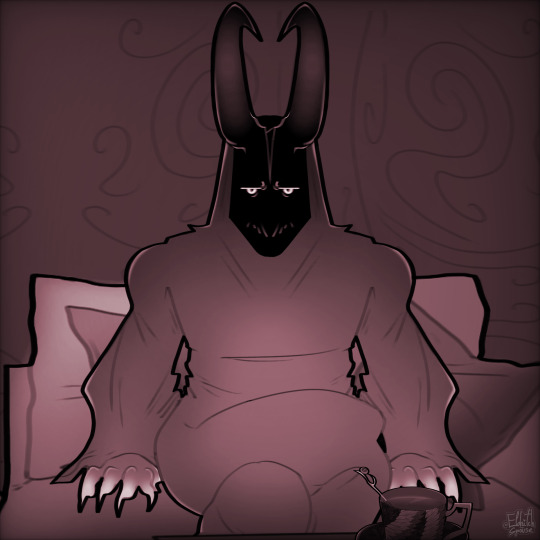
" To the point. I can't say I fault you for that, though I did wish you had a more... Explorative side, at times. It certainly wouldn't hurt you. "
" Oh poor oblivious mentee, I almost envy you and your innocence. We're going to be pioneers after today, we're going to set the records straight. "
(His face suddenly twists in one of stress, trying once more to see something in you. To be sure of something- Whatever it may be.)

" The questions you've asked... I know you and I are the same. Don't you want to fill all the blanks our books so garishly leave? "
" Don't you think it's unacceptable?! "
(He doesn't wait for an answer, tutting.)

" I know you do. "
" So don't worry, there's simply no point in it. "
(A more relaxed look crosses that expanse of darkness you've been calling a face. You think you hear a gulp.)
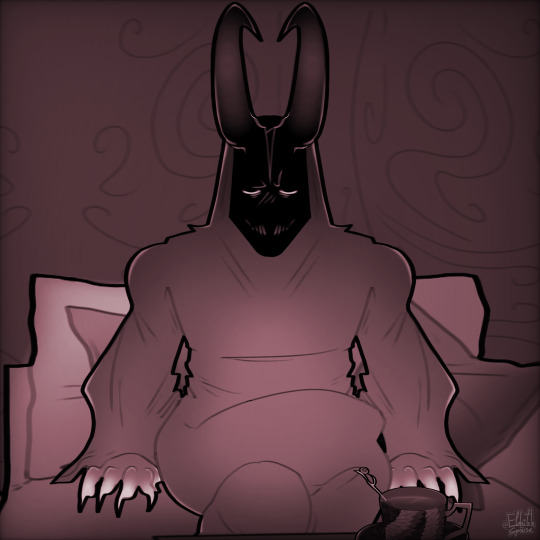
" I've gotten my hands on a piece of scripture- No, that's not quite the word... "
(His brows furrow as he tries to redefine it, correct himself.)

" A set of... Procedures. Instructions. For something truly marvelous. If what little I was able to gouge on my own is correct, then we're dealing with something of such unimaginable proportions! "
(Hudd seems to tense in a fit of overwhelming emotion, all but shaking in place.)
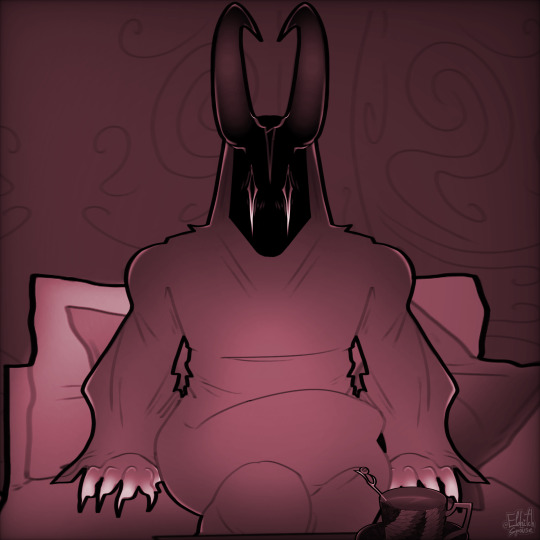
" Mentee -My protégé- This is my Magnum Opus. With this, we can put everyone else to shame. "
(The demonoid's voice turns into a mewled tremble of elation that's almost uncomfortable to the ears.)
" We can do anything. "
(And, as if nothing had transpired, Hudsyn regains some of his composure, now almost seeming to sway in place, fantasizing far away, as he addresses you again.)
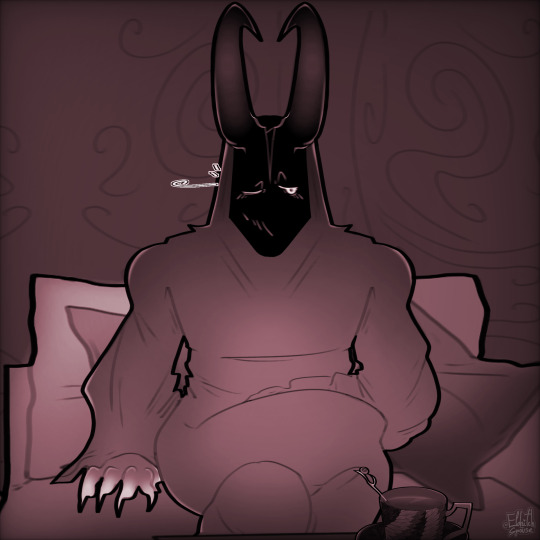
" Mm, but we have time. Is there something you want to get out of the way before we start? "
(The demonoid chuckles.)
" I know I get all sorts of jitters when I'm about to do something big. "
#Hudd oc#pinnie's art#yandere monster#yandere teratophilia#monster oc#demon oc#monster boyfriend#minors dni
205 notes
·
View notes
Text
[2024.11.21] Radio Brainrot - Oops, only good albums!
death thrash || 2024 || Seattle, WA || Redefining Darkness Records
o()xxxx[:::::::::::::::::> o()xxxx[:::::::::::::::::> o()xxxx[:::::::::::::::::>
speed metal || 2024 || Portland, OR || Miserable Pyre
o()xxxx[:::::::::::::::::> o()xxxx[:::::::::::::::::> o()xxxx[:::::::::::::::::>
death metal || 2021 || Buenos Aires, ARG
o()xxxx[:::::::::::::::::> o()xxxx[:::::::::::::::::> o()xxxx[:::::::::::::::::>
#radio brainrot#oxygen destroyer#redefining darkness records#death metal#thrash metal#death thrash#deathrash#kaiju#washington metal#seattle metal#concept albums#underground metal#Bandcamp#speed metal#portland music#miserable pyre#oregon metal#i am the intimidator#horrendum vermis#metal de argentina#argentinian metal
1 note
·
View note
Text
LANA DEL REY MOTHER OF ALT-MUSIC
Lana Del Rey, born Elizabeth Woolridge Grant, has left a profound mark on contemporary culture since bursting onto the music scene in 2011 with "Video Games." Her unique style—a blend of melancholy, vintage romanticism, and social criticism—has redefined alternative pop and given voice to a generation navigating the continuum of nostalgia and modern anxiety.
With influences ranging from classic Hollywood cinema to American literature and dream pop, Lana has built an instantly recognizable aesthetic and sonic universe. Her melancholic and glamorous image, combined with lyrics that explore toxic love, sadness, desire, and American disenchantment, has deeply connected with young audiences seeking authenticity in a world saturated with superficial perfection.
Beyond music, her cultural impact extends to fashion, film, and social media, where she has inspired thousands of visual works, vintage aesthetics, and artistic movements such as the "sad girl aesthetic." She has influenced artists such as Billie Eilish, Lorde, and The Weeknd, demonstrating her role as a pioneer of introspective and cinematic pop.
Lana Del Rey embodies a contemporary sensibility that embraces vulnerability without sacrificing beauty. Her work has not only sparked debate about femininity, authenticity, and popular culture, but has also cemented her status as a modern-day cultural icon, capable of transforming sadness into lasting art.
Of his nine albums (all of which I personally consider bibles) I have my favorite songs, and here are my favorites from each:
Born to Die, Dark Paradise.
Paradise, Cola.
Ultraviolencia, Brooklyn Baby.
Honeymoon, Salvatore.
Lust for Life, Groupie Love feat. A$AP Rocky.
Norman Fucking Rockwell!, The Next Best American Record.
Chemtrails Over The Country Club, Yosemite.
Blue Banisters, If You Lie Down With Me.
Did You Know That There’s a Tunnel Under Ocean Blvd, Margaret feat. Bleachers.
Do you have any favorites from Lana del Rey?

Jacob Gutiérrez :3
8 notes
·
View notes
Text
Album Review: Mutilated By Zombies - Scenes from the Afterlife (Redefining Darkness Records)
Ugly music for ugly times.
Mutilated By Zombies, the Iowa death metal power trio are back with a vengeance with their latest 9-song offering, Scenes from the Afterlife. Out on March 8th, 2024, via Redefining Darkness Records. Ugly music for ugly times. Mutilated By Zombies might still employ the same forceful, fast, technical, and savage sound as found on their debut record five years ago, but they have come a long way as…
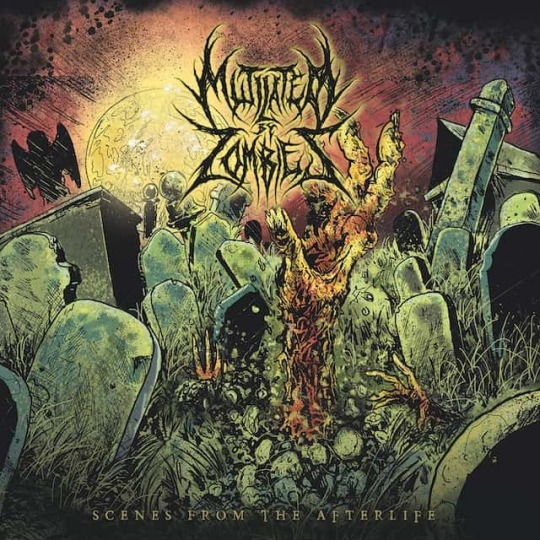
View On WordPress
#Album Review#Death metal#Mutilated By Zombies#Redefining Darkness Records#Scenes from the Afterlife
0 notes
Text
Oxygen Destroyer - Guardian of the Universe (2024)

Macho Frost of Texas Toast Chainsaw Massacre looks at Guardian of the Universe, the brand new album from Seattle kaiju themed thrash death band Oxygen Destroyer, released August 9th on Redefining Darkness Records.
The Pacific Northwest’s own kaiju worshipping death thrash outfit Oxygen Destroyer has done it again. This time a tribute the mighty Heisei Gamera trilogy of the 90’s, which if you have not watched I HIGHLY recommend, they are whoopass. Every album OD drop they get better and better, and this point I don’t know how they are going to top this one. This is easily one of my favorite metal releases of 2024.
Listen to the album and read the full review:
#thrash#thrash metal#thrash death#death metal#extreme metal#kaiju#oxygen destroyer#cave dweller music#heisei gamera#gamera#godzilla#Bandcamp
13 notes
·
View notes
Text

Burial Oath - The Cycles of Suffering
Black Metal from Cleveland, Ohio, U.S.
"THE CYCLES OF SUFFERING" A vivid and dark tapestry, weaving themes of death, supernatural forces, and occult rituals, is available now on all streaming platforms. CD’s will be available via Redefining Darkness Records and Cassettes will be available via @deathmagickcollective .For fans of Gorgoroth, Spectral Wound and MGLA.
1. Void Hunter 05:53 2. Deathbringer 05:22 3. The Cycles of Suffering 03:24 4. Howling Promethean Winds 04:37 5. Shadows Suspended in Dust 04:09 6. Pagan Fires 04:52 7. Kingdom of Fire 02:50
Release date: November 15th, 2024 via @redefining_darkness
@burial_oath
#usblackmetal#burialoath#usbm#blackmetal#blackmetalband#blackmetalmusic#melodicblackmetal#atmosphericblackmetal#blackeneddeathmetal#northamericanblackmetal#blackdeathmetal#oldschoolblackmetal#brutalblackmetal#extremeblackmetal#rawblackmetal#satanicblackmetal#occultblackmetal#supporttheunderground#blackmetalrecords#blackmetalpromotion#blackmetalrelease#newalbum#newblackmetalalbum#blackmetalalbum#2024release#albumcover#bandcamp#Bandcamp
7 notes
·
View notes
Note
hi! i saw your gem painting study that you posted and was curious what your process was? im trying to learn to paint like that and would love some advice :D
Hi! I don't have a speedpaint recorded for my gem painting so here's my process explained on a pearl one!! below the cut since its long!!
I start with a sketch tracing directly over my reference image to see where the eyes/nose/mouth land! I didn't record this part, but It helps me as an exercise before jumping straight in! I tend to paint fully on one layer, but I often save between parts so that if I mess up, I can just go back, which helps with the one layer anxiety!! For tools I have a specific clip studio paint brush I use that's been unfortunately taken off the store :C I suggest downloading and experimenting with a bunch of free oil paint/gouache brushes until you find one you click with!
I focus mainly on defining shadow!! Generally I start with a very rough placement with very high contrast!
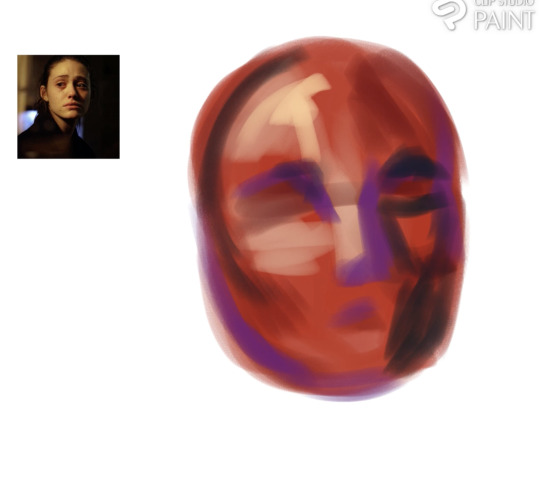
Then I glaze over it with a more skin tone layer which preserves the color variation!
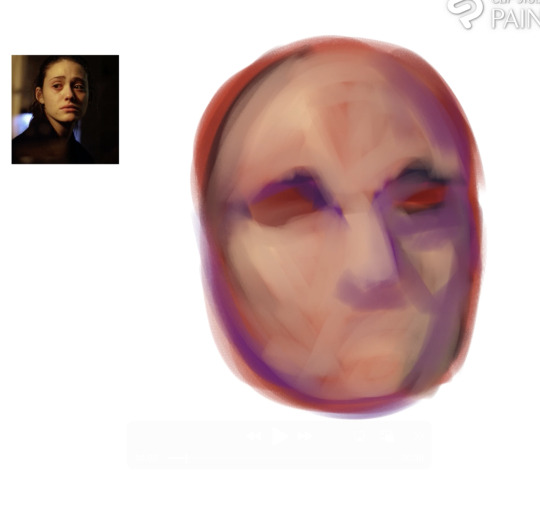
Then I jump in and redefine the details and features!!

For this part I think about the face as planes to see where light would hit!! This is especially helpful around the corners of the mouth and on the cheeks!! I also look at the loomis method for this which should be easy to google!
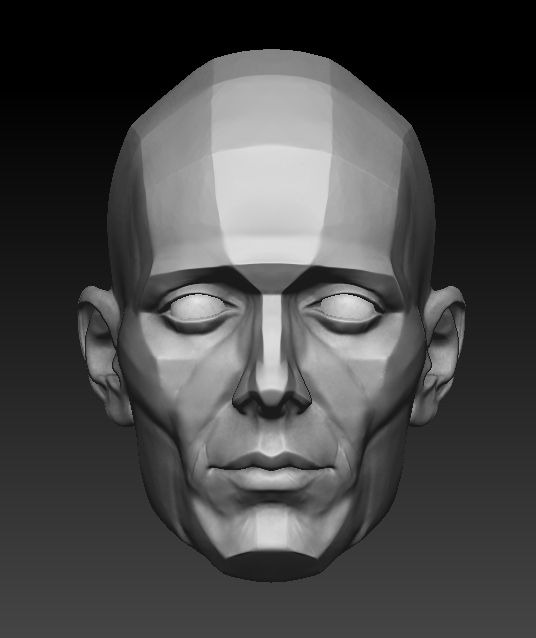
I tend to assign colors to different roles when I work!! In this case yellow was my highlight color so I use a very light yellow in my highlights and try to keep yellow out of my shadows!! For Shadows, I try and have one main shadow color (the one opposite from the light source) and then a secondary shadow color for the shadows created by parts of the face like the nose or eye sockets! In the case of pearl I use Blue/Purple for the main shadow and Red for the secondary shadows!! I also find it helpful to use saturation to provide emphasis! Darker darks and lighter lights have more saturation because they're more powerful in how they shape the piece!! After drawing the face, I have to admit I have a lot less of a process for hair/clothes background! I still haven't found a process of rendering hair I'm happy with sorry!! I mainly just try to keep my value contrast up! A good tip is to put a black saturation layer over your piece AND your reference in order to check values!! This also took me a lot of practice to get to where I am now!! Here's a piece from just 2 years ago of me attempting the same style!! And I still have A LOT more room to improve and learn!

Thanks!! I hope this helps!! :D
6 notes
·
View notes
Text
Beautiful and Broken: Exploring Death Through Postmodern Art
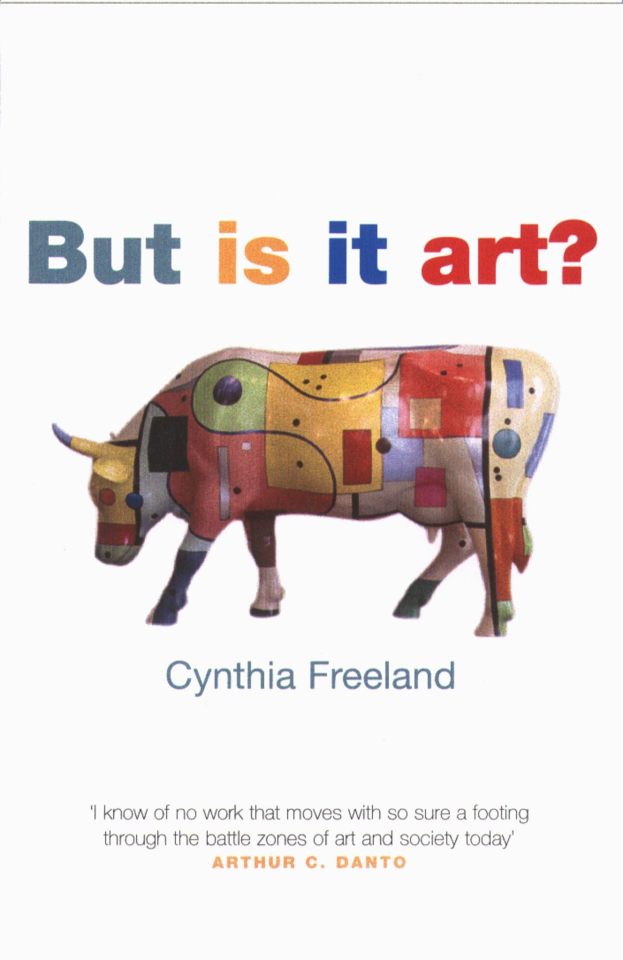
According to But Is It Art? by Cynthia Freeland (2001), the concept of contemporary art is far more complex than it might initially appear. In the opening chapters, Freeland guides readers through a range of philosophical debates centered on the enduring question: What is art? Surprisingly, this very question has sparked debate for centuries.
Freeland highlighted theories by Alexander Baumgarten (1714–1764), David Hume (1711–1776), and Immanuel Kant (1724–1804), all of whom grappled with the elusive question: What is art? Their ideas often centered around taste and the nature of beauty.
It was Hume who proposed that judgments of taste are intersubjective: people with cultivated taste tend to agree with one another. Yet it was Kant who famously claimed that something beautiful has “purposiveness without a purpose.”
Kant’s theory of the judgment of taste and beauty remains one of the most widely recognized and open to interpretation. As Freeland notes, Kant “aimed to show that good judgments in aesthetics are grounded in features of the artwork itself, not just in us and our preferences.”
My own thoughts echo Kant’s, though in a more personal and simplified way: art isn't defined by what you create, but by what it evokes within you during its creation. Art is what feels aesthetically meaningful to the individual and the emotions it awakens. It doesn’t need to appeal to everyone—and that’s precisely the beauty of it.
Then comes Contemporary Art, which stretches and redefines the “rules” of what art can be. It often centers on current affairs, taboo subjects, political ideology, and social or cultural dynamics. While all art is art, not everyone is drawn to themes that spotlight death, war, nepotism, oppression, gender, or race. Yet contemporary art—regardless of how it’s received—offers us a window into the artist’s mind and a vivid snapshot of the culture in which it was created.
Adding to the complexity is postmodernism, whose defining traits include relativism, pastiche and eclecticism, irony and self-awareness, hyperreality, and the rejection of authority. What draws me to postmodernism is its ability to blur the boundaries between reality and representation. Several compelling examples highlighted in Dino Felluga’s postmodern theory (Purdue University) include Andy Warhol, Frank Gehry, Roy Lichtenstein, MTV, The Matrix, Dark City, and The Truman Show—each reflecting postmodern ideas in distinct, thought-provoking, and intriguing ways.
The two pieces I have chosen, while truly artistic, highlight the beauty found in death and the reality that represents both its fragility and inevitability—inviting the viewer to confront loss not with fear, but with reverence and reflection.

What Dreams May Come
What Dreams May Come (1998) was released during a time of major societal, political, and generational shifts. The film arrived at the cusp of a new millennium and explored taboo topics—grief, suicide, the afterlife—while embracing the romanticization of death. These ideas had been explored before, but never with the same visual and emotional beauty that this film brought to the screen.
While it may not be immediately categorized as postmodern, the film clearly emphasizes many of its key traits: the blurring of reality and representation, intertextuality and genre fusion, the rejection of grand narratives, and hyperreality. It invites you into a world where painting, memory, and metaphysics coexist within a painful dream that feels real.
What Dreams May Come is one of my favorite Robin Williams films, but I haven't been able to watch the movie since his death. At this moment, the irony of the situation is too much for me, but I hope to watch it again in the future.
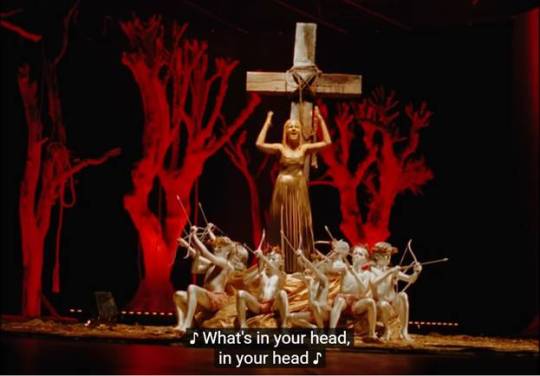
Zombie by The Cranberries
Before Zombie dropped in 1994, Island Records was hesitant about releasing something so politically loaded. The lyrics and composition were already haunting and beautiful, but it wasn’t until the music video came out that people really couldn’t ignore the message.
The song was powerful on its own, but the imagery in the video—like children playing with guns and Dolores O’Riordan singing from the foot of a cross surrounded by cherubs—took it to another level. It creates this strange mix of beauty and violence, layering irony, emotional contrast, and that eerie sense of blurred reality. It’s like a visual critique of how we process violence and innocence, and it challenges us to question the stories we’re told about war and justice.
Together, the song and video embody key postmodern themes: irony and emotional contrast, hyperreality and media critique, and rejection of grand narratives.
In the end, whether it’s a song, a film, or a surreal painting, what matters most is the connection it sparks—and the truth it helps ground us, even if just for a moment.
But Is It Art? Cynthia Freeland (2001) https://www.uh.edu/~cfreelan/aesth/OUP.html
General Introduction to the Postmodern Dino Felluga, Purdue University, postmodern theory 2002 https://www.cla.purdue.edu/academic/english/theory/postmodernism/modules/introduction.html
What Dreams May Come (1998) https://en.wikipedia.org/wiki/What_Dreams_May_Come_(film)
Zombie - The Cranberries (1994) Dolores O'Riordan, singer and songer writer
youtube
https://en.wikipedia.org/wiki/Zombie_(The_Cranberries_song)
#art#art theory#contemporary art#postmodernism#postmodern art#essay#personal essay#what dreams may come#robin williams#the cranberries#zombie#dolores o'riordan#but is it art?#cynthia freeland#dino felluga#austincc#the arts in contemporary society#alexander baumgarten#david hume#immanuel kant#Youtube#humanities#academics#sociology#first post#girl blogger#music#movies#film#cinema
2 notes
·
View notes
Text
The year was 1991, and the ground shifted. Terminator 2: Judgment Day didn't just smash box office records; it redefined cinematic sequels and etched itself into the halls of sci-fi legend. The liquid metal T-1000, the protective T-800, the relentless stakes – it was a masterclass. Then came the inevitable return in 2003 with Terminator 3: Rise of the Machines, followed by a detour into the past with Christian Bale leading the prequel, Terminator Salvation.
But the pull of the future (and the past) is strong. In 2015, Terminator Genisys attempted a reboot, and then, in 2019, the iconic roar of the Terminator engine echoed once more with Terminator: Dark Fate. This time, however, felt different. For the first time since the groundbreaking Terminator 2, the visionary director and writer himself, James Cameron, returned to the franchise, not to direct, but to produce and shape the story. And that wasn't all. The legendary Sarah Connor, the fierce protector brought to life by the one and only Linda Hamilton, strapped on her weapons once again. Adding to this potent mix was Tim Miller, the director who unleashed the irreverent energy of the first Deadpool. The stage was set for something special.
Arnold Schwarzenegger, the man who embodied the Terminator, recalled his decision to return.
Despite this powerhouse reunion of key players, Terminator: Dark Fate arrived in theaters to a somewhat muted reception. It didn't ignite the same fervent enthusiasm as its predecessors. Yet, like a Terminator relentlessly pursuing its target, the film has found a second life, a new audience in the vast landscape of streaming.
This begs the question: Was Terminator: Dark Fate a victim of misjudged expectations? Did it fail to capture the magic despite the return of Cameron and Hamilton? Or was the initial lukewarm reaction justified? We want to hear your take!
If you missed Terminator: Dark Fate in theaters or are ready for a re-evaluation, you can find it on DVD, Blu-ray, 4K, digital platforms, and streaming on Paramount+.
#Terminator#Terminator 2#Terminator Judgment Day#Terminator 3#Terminator Rise of the Machines#Terminator Salvation#Terminator Genisys#Terminator Dark Fate#James Cameron#Linda Hamilton#Arnold Schwarzenegger#Tim Miller#Sci-Fi Movies#Action Movies#Movie Retrospective#Movies#Movie News#Entertainment#Entertainment news#Celebrities#Celebrity#celebrity news#celebrity interviews
2 notes
·
View notes